

10 essential tips for the first time business traveler
Heading off on your first business trip and not sure how to prepare?
From packing like a pro to working and adapting to the local time — we've got the top business travel tips to help you master it all! These travel tips will help you save time and avoid the most common issues. Just sit back, relax and keep reading to get ready for the first of many business trips.
1. Pack like a pro
Start with proper carry-on luggage and take the time to pack light. Packing cubes and internal pockets can make all the difference for business travel. Bypass the lineups and head straight to your destination – you're on a roll! Read our packing personalities tips to find out which packing personality you are.
Here are a few key tips for carry-on luggage:
- Good quality materials
- Lightweight
- Easy to maneuver (4 spin wheels are the best!)
- Security lock
2. Papers, please
As a first-time business traveler, you might be nervous about forgetting important documents. Let's do a quick review. For international travel, you need a current passport with at least six months until expiry.
And there's more. Do you need a visa or other authorizations? Do you have the correct type of visa for business travel? Starting in 2025, US passport holders traveling to Europe will need to apply for visa authorization through the European Travel Information and Authorization System ( ETIAS ).
There are many potential paperwork disasters on business trips, but lucky for you, your dedicated agent knows it all.
Check out the Traveler Resource Hub for more helpful information on travel visas.
3. Is your business travel covered?
Before you take to the skies, check business travel insurance off your to-do list. Whether it's a short trip or a long one, on a first business trip, we want to make sure you're covered.
Money may not buy happiness, but it can get you an annual policy – saving you time, money and many headaches later. One last thing: don't forget to scope out the risk landscape of your destination to make sure it's in policy. Questions? Your dedicated Travel Consultant is in the wings.
Ask about business travel insurance coverage for trip interruption and emergency medical treatment. Corporate Traveler offers a range of insurance products both for single-trip and multi-trip annual plans. Contact your Travel Manager for more information .
4. Level up your airport experience
Airline lounges can reduce the stress of flying and lift you out of the chaos and noise of the main concourse. Step into peace and quiet, showers, healthy snacks and drinks for free (hello, morning mimosa!).
Business Class fares generally include lounge access, but some are available for a fee. Credit card rewards programs can also give you access to airport lounges. There is no better place to be if you're riding out flight delays or prepping for important business meetings.
If you're on a business trip during a busy time of year, this guide to airport survival for the holidays shares the top airport tips.
5. Going the distance
The carry-on bag is stowed and you're settling in. If you're on a business trip to a different time zone, try to eat and sleep during the flight based on the local time zone you're heading to. Body clocks are hard to reset, and it's better if you can start the transition mid-air.
While sleeping in Economy Class can be a challenge, earplugs and noise-canceling headphones may help. If your business meeting is crucial, upgrading to a Business Class fare could be the thing you need if your travel policy allows.
For long-haul trips, make sure your member numbers are locked and loaded so you can maximize loyalty programs . Once you land, eat a meal, stay hydrated and move around a bit to beat jet lag.
6. Take advantage of tech
Apps exist for almost everything, and they can make your first business trip more relaxed, too. Keeping all of your travel itinerary together, finding a place for dinner, or translation apps are all at your fingertips.
We've selected the 9 best travel apps to help you plan ahead and stay organized while traveling. Get travel tips from other travelers and locals too!
7. Always ask about amenities
Global travel is a huge industry, and many operators are adopting sustainability programs. Small changes can make a big difference, especially on business trips.
It's now common for certain services and supplies to be on request at business travel hotels as part of efforts to reduce waste. Daily housekeeping, razors, lotions, and other amenities are still available, but they might not be stocked in the hotel room by default. Pack light and ask what's available when you check in.
What's the strangest perk we've seen? A full set of gym clothes and shoes to borrow while staying at a hotel.
8. Counting costs
A greasy burger or room service? Should you use a limousine, take a taxi, or use public transportation? Check with the boss before you travel on what counts as travel expenses rather than return to a chilly reception and a bill you have to pay.
Hold onto all your receipts and make a note on them if they're low on details, like a taxi ride.
9. Work smart and stay refreshed
It's easy to go from meetings to drinks to dinner to bed and repeat. It's important you keep a check on your mental and physical health while you travel. Jet lag can sneak up on you. The first day, you feel fine, and then, to your surprise, you wake up at 4 am every day.
With the rising trend of digital nomads, business travelers have come up with new ways to find balance while on the road. A physical change of scenery can help.
Instead of working in the evening in your hotel room, why not answer emails in the lobby or patio of the hotel? Set a clear divide between work and travel, then your mind will be clearer, and you'll look and feel fresher.
10. Flawless first impressions
When you travel on business trips, you're representing your company and yourself. And your country. But a few travel tips can help you make a good impression. Know the local laws, be courteous and tip when needed.
Pro travel tip: watch what you eat and drink on a business trip. It may be fun to experiment on the deep fried delights from a street food vendor but why take the risk? Stick to bottled water in some destinations and avoid ice if you can.
Want to learn more? Subscribe to the CT newsletter to get ready for your next business trip.
Stay up to date so you never miss a beat!

History of business travel
Business travel is nearly as old as business itself. Stacker traced the history of business travel, from ancient trade routes and steam locomotives to business-class airfare.
From the first trade routes that were established in Eurasia in 3000 B.C., the exchange of goods across the globe has been a major driver of business travel. As technology advanced, so too did business travelers' modes of transport. The horse-drawn caravans of the Silk Road gave way to the steam engines of Europe and the United States centuries later, and later yet the invention of the airplane would cut travel times even more substantively.
As travel became easier, the world grew increasingly interconnected. Multinational corporations could communicate between their constituent parts with ever-increasing ease, and distributors of goods and services could offer them to the entire world instead of just their small, geographic spheres.
Business travel is applicable for all types of workers, from corporate executives and tradespeople to artisans, and construction workers. Beneficiaries of business travel include the entire travel and hospitality industry, from airlines to hotels to train companies.
Keep reading to learn more about the history of business travel.
You may also like: 50 ways air travel has changed over the last 100 years

4000 B.C.: First roads are constructed
The first roads were built around 4000 B.C. in Mesopotamia, which became the country of Iraq. The stone-paved streets ran through the cities of Babylon and Ur. The wheel would not be invented for another 500 years , so the primary mode of transport along those roads was on foot. The development of these roads allowed business districts to establish themselves along certain streets, demarcating places for business from places for leisure, rest, and home. Millennia later, business travelers would use the same basic concept of a road to travel relatively short distances for meetings, conferences, and other business purposes.

3000 B.C.: First major trade routes form along Arabian Sea
By 3000 B.C., ships were establishing routes to trade goods across the Arabian sea. Some of the primary goods traded along these routes were copper ore from Oman, teakwood from India, and incense from Arabia. Traders bartered these items for wheat, cheese, and barley, which were common in ports and countries further north. For centuries, ships were the primary mode of transport for goods between distant parts of the world. Not until the invention of the airplane in the 20th century was there another way to get tradeable goods between continents and across oceans.

13th century: Marco Polo travels the Silk Road
Marco Polo was an Italian merchant, explorer, and writer who traveled the Silk Road in the 13th century. In 1271, he traveled with two family members through an extraordinary swath of land on a 24-year journey. Countries the Polos trekked through included Armenia, Persia, Afghanistan, Georgia, and Azerbaijan. The travelers intended to embark from the Persian port city of Hormuz into China by sea but abandoned this plan when they saw the poor condition of the ships they were meant to board for travel. The Polos traveled primarily on horseback through Europe, Eurasia, the Middle East, and all the way to China.
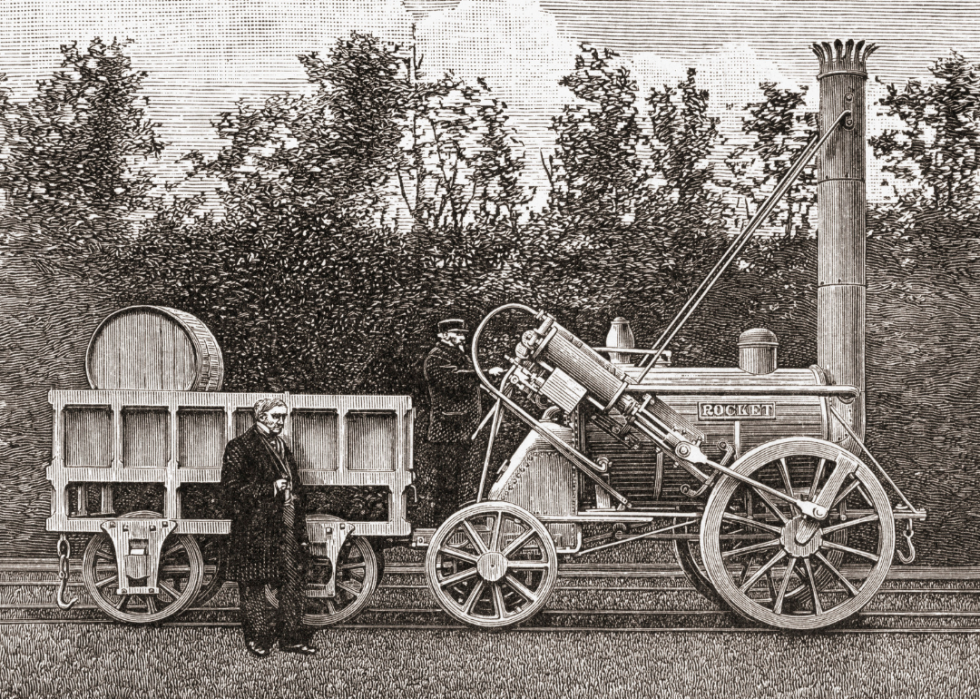
1825: First steam railway creates the commute
In 1825, the first steam locomotive transported 450 people 25 miles between the two towns of Darlington and Stockton, England, at 15 miles per hour. The engine would have enormous implications for the future of travel. Once the power of steam engines became obvious, plans for horse-drawn railways were scrapped. In their place, railways that could transport heavy goods like coal—not to mention people—sprang up all across the world. In the United States, the railway facilitated westward expansion through the country, which led to the development of railway and mining towns throughout the American West, as people moved westward in pursuit of business opportunities and new ventures.

1930s: New Deal infrastructure projects bring construction workers across the country
In the 1930s, the United States was emerging from the depths of an economic depression. President Franklin Roosevelt's New Deal put Americans to work on a vast array of projects. In Tennessee, the federally created Tennessee Valley Authority addressed a wide range of issues facing the region, such as reforestation and providing electricity to homes and businesses. Other major projects such as The Hoover Dam, LaGuardia Airport, and New Orleans City Park were all constructed by workers contracted through the New Deal. Towns were built and dedicated across the country to housing construction workers and their families.
You may also like: Countries most dependent on tourism

1935: The DC-3 commercial plane transforms business travel
The invention of the commercial airplane would change business travel forever. Where business travel had initially been limited to destinations within driving or railway distance—or conducted via arduous longer journeys—the development of the DC-3 plane in 1935 heralded the dawn of the era of quick flights. The DC-3 entered commercial service flying coast-to-coast across the United States, albeit with an overnight stop. Business travelers who once would have had to embark upon a week-long train or car journey on the same route could complete it in less than a day. Decades later, business travel in the air is exceptionally popular.
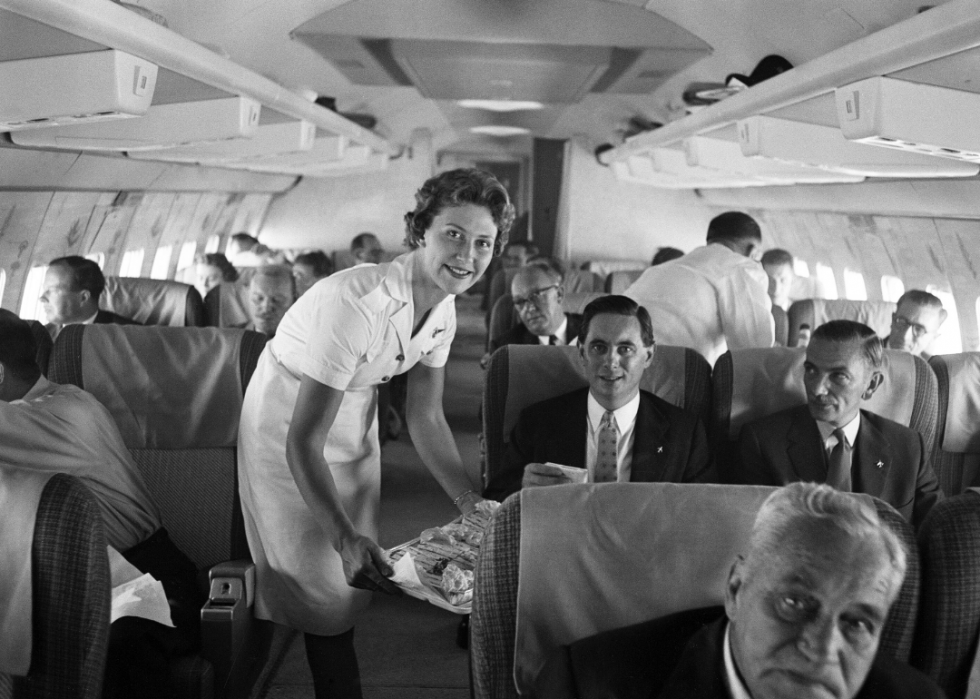
1958: The first transcontinental business flights
In 1958, Boeing introduced the world to 707 airliners. These would prove to be transformative for transcontinental business travel . That same year, Pan Am introduced overseas flights on 707s. This allowed business partners, for example, in London and New York, to meet to discuss business far more efficiently than ever before. A journey that would have taken nearly a week at sea could be cut down to just several hours on the 707s.
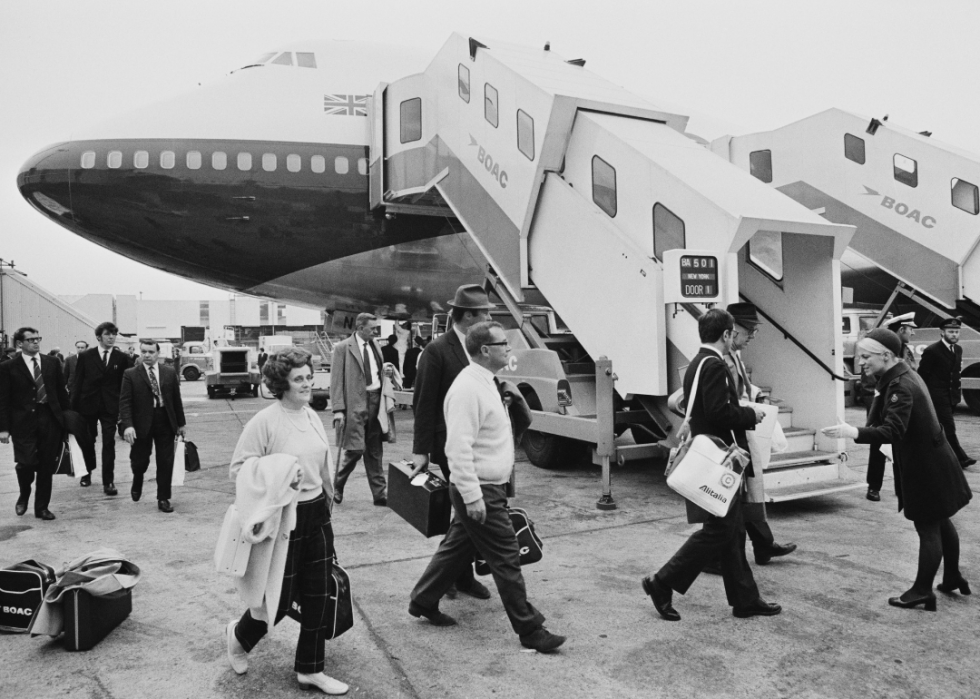
1979: Business-class flight tickets are introduced
In 1979, the airline Qantas introduced business class tickets. Due to the rising popularity of air travel in the preceding decades, airports and planes themselves were more crowded than they had been in the early days of travel. Qantas—and other airlines shortly after—introduced business fares as a way to shield travelers from crowds . The extra space and separation from the noise of the airport came with a price, however. Business-class fares were more expensive than those sold for coach. Today, a business-class fare can cost up to five times the price of a coach ticket.
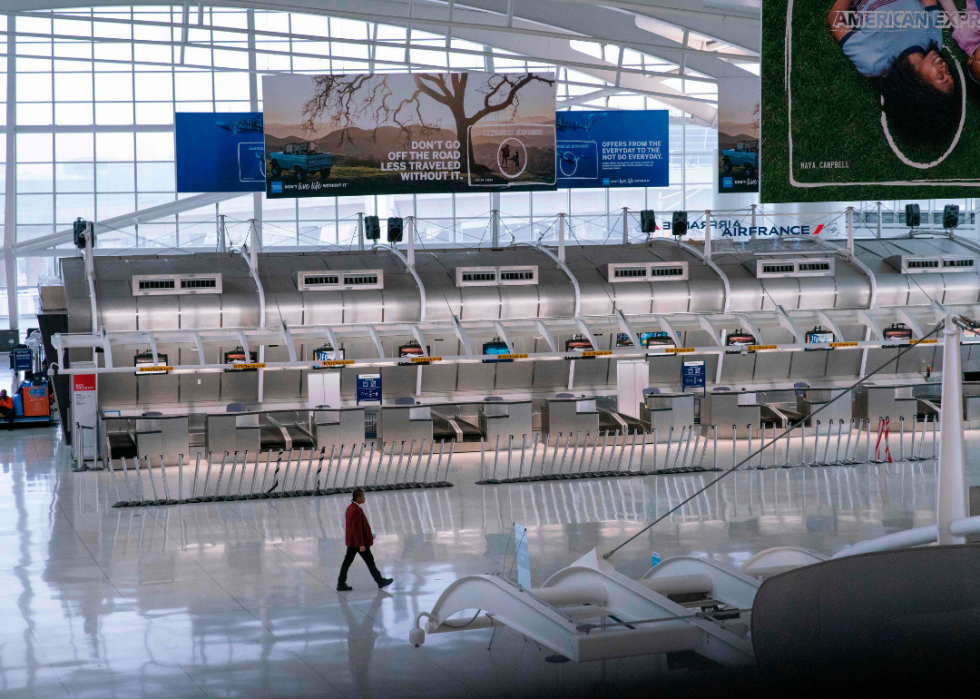
2020: Business travel grounded
Business travel was sidelined as COVID-19 swept the globe in 2020. Travelers who once would have boarded trains, planes, and automobiles to shake hands with business contacts in person were suddenly told to stay home. Business meetings shifted to Zoom and other forms of virtual communication. Business travel budgets declined by 90% or more in 2020. Further, 93% of companies suspended international business travel.

2021: Business travel makes a comeback
In 2021, there are signs that business travel is making a comeback. After 18 months of pandemic-related restrictions on travel, people are itching to hit the road again. A whopping 96% of business travelers have said they are excited to travel again . A further 80% say they are concerned their careers will suffer if they do not make face-to-face connections in business. Industry experts have said that business travelers are now open to traveling further, taking extended stays, and staying in new types of accommodations.
You may also like: These 10 companies have had the biggest impact closing the gender wage gap since 1995
Trending Now
100 best john wayne movies.

Top 50 women-directed movies of the last 10 years

Major newspaper headlines from the year you were born

50 longest-running TV series

Business Travel
- Home Inspiration
- Sustainable Living
- Wellbeing & Wellness
- Area Guides
- Whitepapers

First Business Travel: 8 Essential Tips for a Successful Trip

Embarking on your first business travel can be a rite of passage for many professionals. It presents an opportunity to represent one’s company in new environments, forge valuable connections, earn business travel incentive , and sometimes even explore new cultures.
Early preparation is key to maximizing the benefits of the journey, and this begins with a clear understanding of what the trip entails and what is expected. Knowing the cultural norms and business etiquette of the host country can be instrumental in leaving a lasting impression.
Careful planning of the itinerary and packing the right essentials ensures that the trip runs smoothly. Being equipped with the necessary technology to stay connected is important for both managing work commitments back home and delivering on objectives while away.
Keeping track of expenses diligently is also crucial for subsequent reimbursement and budgeting for future travel. Above all, health and safety should never be compromised, regardless of the destination or the purpose of the trip.
Planning Your Itinerary
When embarking on their first business trip, one must meticulously plan their itinerary to ensure efficiency and preparedness. You should consider vital aspects like destination research, flight bookings, accommodation options, and local transportation.
Destination Research: Thorough destination research is crucial for a successful business trip. One should be aware of the local customs, business practices, and any potential safety concerns. Checking out the dos and don’ts of business travel can guide the cultural norms and help anticipate requirements such as visas or vaccinations.
Booking Flights: Securing flights well in advance often ensures better rates and preferred seating arrangements. Consideration of the flight timings, routes, and any layover requirements is paramount. It’s advisable to adhere to the company’s travel policy while making flight arrangements.
Accommodation Options: Choosing the right accommodation hinges on both its proximity to meeting venues and the amenities offered. Individuals should compare multiple options, considering both price and convenience. For detailed steps on booking accommodation , one might review guides like comprehensive business travel arrangements.
Local Transportation: Planning for local transportation is an often underappreciated aspect of trip planning. One should investigate the most efficient modes of ground transport, like taxis, ride-sharing apps, or public transport systems. The aim is to ensure that they have a reliable means to navigate between appointments with minimal delay.
Packing Essentials
When embarking on one’s first business trip, it’s crucial to ensure that all packing essentials are accounted for to facilitate a seamless experience. This section delves into the vital categories that one should focus on travel documents, suitable apparel, and technology needs.
Travel Documents: These are the non-negotiables for any business traveller. Passport , visa, itinerary, and boarding passes should be top of the list. It’s advisable to carry both physical and digital copies
Suitable Apparel: Every business traveller needs to present a professional image, therefore, selecting the appropriate attire is paramount. Aim to pack a versatile wardrobe that can be mixed and matched for different occasions – a tailored suit, dress shirts or blouses, and smart casual options for less formal meetings.
Technology Needs: Staying connected and operational is essential in today’s business environment. Ensure the inclusion of items such as a laptop , smartphone, relevant chargers, and international adaptors. A portable power bank can be a lifesaver during long flights or back-to-back meetings.
Understanding Business Etiquette
This involves recognising and respecting cultural differences, adhering to meeting protocols, and navigating the complexities of gift-giving customs.
Cultural Awareness: Every country possesses its own unique set of cultural norms and practices. Travellers should invest time in learning about these distinctions before embarking on their journey.
Meeting Protocols: Meetings across the globe follow various formalities that one must observe. Proper greetings often involve a handshake, but the firmness and duration can vary widely. In Europe, a firm grip is common, contrasting with some Asian cultures where a lighter touch is preferred.
Gift-Giving Customs: The act of gift-giving can be a potent tool in fostering business relationships. However, it must be approached with sensitivity towards the cultural context.
For instance, in China, gifts should be presented with both hands and accepted only after a degree of polite refusal. One must ensure that gifts are not construed as bribes, which means they should be thoughtful but not overly extravagant.
Staying Connected
When embarking on a business trip, a traveller’s ability to stay connected is paramount.
Communications Infrastructure: A traveller needs access to a reliable communications infrastructure. Before departure, one must verify whether the destination offers widespread cellular coverage and the availability of international roaming.
Time Zone Management: Effective time zone management is crucial to maintain productivity and avoid scheduling mishaps. Tools such as world clocks and online meeting schedulers can assist in planning across different time zones.
Internet Accessibility: Travellers should inquire about Wi-Fi availability in accommodation, co-working spaces, and other venues relevant to their business needs. Portable Wi-Fi devices or international data plans are also options for ensuring uninterrupted internet access.
Health and Safety
Ensuring health and safety during business travel is pivotal. Travellers should secure comprehensive travel insurance, adhere to medical precautions, and be aware of emergency procedures.
Travel Insurance: This is a fundamental aspect of business travel. Policies should cover medical emergencies, lost luggage, and trip cancellations. Employers are advised to verify that the business travel insurance coverage meets the requirements of their travellers’ destinations and the nature of the trip.
Medical Precautions: Before departure, one should consult a healthcare professional to discuss vaccinations and medication . It is also imperative to be informed about the potential health risks associated with the destination, such as food and water safety, and take necessary precautions like only consuming safe food and bottled beverages .
Emergency Procedures: Travellers should familiarise themselves with the local emergency numbers and the location of the nearest embassy or consulate. Companies must equip their employees with an emergency contact list and ensure they understand the employer’s duty of care in the event of a crisis.
Expense Tracking
Effective expense tracking is a critical component of business travel management.
Budget Planning : One must determine the total travel budget before embarking on a business trip. This involves not only estimating the costs for flights and accommodation but also accounting for ground transportation, meals, and incidental expenses.
Receipt Management: Receipts are the foundation of expense tracking. Travellers should collect itemised receipts for all business-related expenses during their trip. To facilitate this, travel management companies have adopted mobile applications that allow you to generate and manage receipts. is accurately recorded.
Reimbursement Policies: Clear reimbursement policies are essential for managing business travel expenses adequately. Employees must be informed of what is reimbursable, the process for submitting expenses, and the timeframe for reimbursement.
Maximising Productivity
In approaching business travel, one’s focus should be centred on the optimisation of time and resources.
Workflow Management: Travel offers a unique chance to reassess one’s workflow , often leading to improvements in efficiency. One should ensure that their time management strategies are robust , allowing for preparation and review during transit. An individual might utilise travel time to prepare for meetings or to catch up on industry-relevant literature.
It’s crucial to have access to all necessary work materials, ideally through cloud services that provide seamless access to documents and files from various locations and devices.
Networking Opportunities: Business travel often presents numerous networking opportunities. Engaging with new and diverse individuals can provide fresh perspectives and lead to professional growth and collaboration. They should strive to make connections that extend beyond the duration of the trip, sustaining relationships through follow-up communications.
When attending conferences or meetings, one should:
- Engage with speakers and attendees.
- Exchange business cards.
- Participate in social events related to the business event.
By doing so, they lay a foundation for a diverse professional network that can be instrumental for future endeavours.
Post-Trip Follow-Up
Once a business traveller returns, a systematic approach to post-trip procedures is essential for accurate record-keeping and relationship management.
Expense Reporting: Business travellers must submit their expense reports promptly. They must include all receipts and itemise expenses to ensure transparency and compliance with company policy. Organisations can streamline this process through digital solutions that allow for the electronic submission and tracking of expenses. For example, conducting post-trip reviews is a practice that can highlight areas for financial optimisation.
Meeting Debriefs: The traveller should provide a detailed debrief of their meetings and any actionable intelligence gathered. This ensures that the knowledge acquired doesn’t remain siloed with the traveller but is disseminated across relevant departments.
Relationship Nurturing: Post-trip engagement with clients or partners reinforces the relationships established. Following up with a thank you message, addressing any outstanding queries, and planning for future interactions are all crucial steps.
The timing and method of this correspondence should be considered to maintain professionalism and build ongoing client relationships .
Key Takeaways
- Successful business travel requires meticulous upfront planning and awareness of the destination’s business practices.
- Organisational skills and technological preparedness are essential for maintaining productivity and managing work during the trip.
- Post-trip evaluations and thorough follow-up contribute to professional growth and the effectiveness of future business travels.
What is the best travel agency to use?
For tailored travel solutions, Corporate Traveller is regarded as a reliable agency for business travel needs. They offer a user-friendly platform called Melon, providing a streamlined way to book flights, hotels, and car rentals.
What preparations are recommended before embarking on a business journey?
Ensuring all required documentation, such as visas and travel insurance, is in order before departure is crucial. A dedicated agent can assist with navigating complex immigration requirements and making sure travellers have the necessary coverage.
In what ways can business travel add value to professional goals?
Business trips can offer numerous professional advantages including networking opportunities, personal brand development, and exposure to new markets and cultural insights. Engaging directly with clients and industry peers during travel can also lead to strengthened business relationships and collaborative opportunities.
Read more Business Travel articles

World Environment Day: How To Aid Restoration on Your Next Business Trip

What is Baggage Allowance? How to Handle Issues

International Women’s Day 2024: How Business Travel Can Inspire Inclusion

What is a Travel Management Company? TMC Explained
- English (UK)
- English (CA)
- Deutsch (DE)
- Deutsch (CH)
The ultimate guide to traveling for work: 35 best tips for business travelers
Before you travel…, 1. check your company’s business travel policy, 2. stick to carry-on bags only, 3. keep your essentials packed and ready to go in your suitcase, 4. keep your essentials handy when on the road, 5. pack both business attire and casual clothes, 6. keep security checks in mind when you pack, 7. make comfort a priority, 8. sign up for rewards programs, 9. make sure you charge your electronic devices, 10. fly non-stop, 11. make use of airport lounges, 12. use a suit bag, 13. bring a power bank, 14. bring your (travel size) toiletries, 15. pack healthy snacks, 16. choose your plane seat wisely, 17. do your research on foreign business etiquette, 18. download helpful apps, 19. bring a power adapter, 20. check in beforehand, during your business trip…, 21. choose water, skip alcohol, 22. if you have a meeting shortly after landing and need to be fresh, try drinking coffee two hours before the meeting, 23. layover tip: take the time to connect, 24. stretch, 25. adapt to meal times as soon as possible, 26. beat jet lag with exercise, 27. don’t be tempted to sleep as soon as you arrive, 28. try to stick to your most important daily routines, 29. take pictures of all your receipts, 30. store your receipts properly, 31. use a firewall when using public internet, 32. there are alternatives to working in your hotel room, after your business trip…, 33. don’t forget to report your expenses, 34. send thank you emails, 35. leave reviews, did you find this article useful.
?)
Make business travel simpler. Forever.
- See our platform in action . Trusted by thousands of companies worldwide, TravelPerk makes business travel simpler to manage with more flexibility, full control of spending with easy reporting, and options to offset your carbon footprint.
- Find hundreds of resources on all things business travel, from tips on traveling more sustainably, to advice on setting up a business travel policy, and managing your expenses. Our latest e-books and blog posts have you covered.
- Never miss another update. Stay in touch with us on social for the latest product releases, upcoming events, and articles fresh off the press.
?)
10 awesome places in Australia for a corporate retreat
?)
10 awesome places in Singapore for a corporate retreat
?)
Top 10 best team-building activities in California
- Business Travel Management
- Offset Carbon Footprint
- Flexible travel
- Travelperk Sustainability Policy
- Corporate Travel Resources
- Corporate Travel Glossary
- For Travel Managers
- For Finance Teams
- For Travelers
- Thoughts from TravelPerk
- Careers Hiring
- User Reviews
- Integrations
- Privacy Center
- Help Center
- Privacy Policy
- Cookies Policy
- Modern Slavery Act | Statement
- Supplier Code of Conduct
Small Business Trends
15 business travel tips.

If you buy something through our links, we may earn money from our affiliate partners. Learn more .
Business travel can be fun and exciting, but there are many things you can do to make the experience better for a successful business trip . Whether you’re going for international business travel or domestic business travel, there are lots of things you can do to optimize business travel, including business travel safety. Here are some of the key business travel tips to keep in mind for your next trip.
How to Use These Tips for Business Travel
These tips will likely be most beneficial for a first-time business traveler, but even seasoned business travel professionals will find them valuable as reminders. These great tips can be incorporated into your business travel plans before you leave for your destination, as well as for when you get there.
Best Travel Tips for Your Next Business Trip
We’ve put together some essential business travel tips to help make business trips easier and help you gain more from each trip in this article, with additional travel safety tips for women available as well. This is by no means an exhaustive list, so feel free to share more business travel tips in the comments, as it will help others!

1. Look for coworking spaces on your next business trip
While staying in your hotel room might be tempting the whole trip, why not break the monotony a little? A coworking space is a great way to meet people on your corporate travels, and it makes it easier to work. You can take a business meeting there or rent a desk to get some work done and stay connected without being cooped up in a hotel room all day. As an alternative, you can also go to a local coffee shop to work out of as well if a coworking space doesn’t work.
2. Collect air miles
If you’re flying out for trips, you should sign up for air miles with any airline used for corporate travel and/or your preferred airline. Miles add up when you travel with the same airline, and you can use the perks like a cheaper flight, rewards, and advantages to your benefit for personal and professional travel moving forward.
3. Join a hotel rewards program
Asides from an air miles program, if you’re a frequent business traveler, you should also be part of a hotel rewards program. Like air miles, hotel rewards programs will give you a lot of perks and benefits as you accumulate points for hotel rooms booked through business travel. That can prove to be useful both personally and professionally, so make sure all your points get logged.

4. Seek out airport lounge access
Long layovers, flight delays, a long flight, or a combination of it all can often mean that you’re stuck in airports for a long time and generally feel pretty exhausted. Airport lounges are definitely something to consider since they offer a lot of benefits, including airport snacks, food, showers, a place to rest away from the crowds, and more. You can get access to airport lounges in a few different ways: If you’ve booked first-class or business class, most airlines usually have their airline lounges. You can also gain access through airline miles, a travel credit card, and more, so make sure to research beforehand.
Read More: international business travel
5. Maintain healthy habits
Even when traveling for work frequently, it’s crucial to take care of yourself and establish some kind of work-life balance. Jet lag and adjusting to local time are often issues during international business travel. However, it’s easy to let habits slip during the trip, even with domestic travel. Opt for healthy snacks where possible and use the hotel gym where you can to maintain cardiovascular health and take a break from work. You could also plan ahead and pack a bathing suit so you can use the hotel pool if the gym seems less appealing, but the goal is to make sure your physical health stays a priority even when traveling across a different time zone.
6. Look for rental car deals
If you need to drive a lot during your business travels, you should always keep an eye out for rental car deals. Many hotels and nonstop flights with certain airlines have package deals with rental cars that can save money and make it more efficient. You could also have it set up so that you’re able to pick up the rental car from the airport and drive straight to your hotel, rather than having to search for a taxi for added ease.

7. Pack Light
The best packing tips for business travelers tend to start with the same one: Pack light. Packing light makes it easy to move through airports and means less time spent trying to stuff everything into your suitcase last minute. If you want the essentials packed easily like travel toiletries, travel kit, casual clothes, and business clothes but don’t have space, there are options. For example, you can invest in items like packing cubes to help you stay organized while packing more. If you’re packing a suit, you can also get a suit bag for your suit jacket to avoid wrinkles.
8. Find your perfect carry on
Carry-on bags are essential travel bags that provide a lot of benefits for travelers. They’re usually pretty room, and having carry-on luggage means that you can take your bag with you on the plane. In addition, it speeds up travel quite a bit since you’re not waiting at baggage claim. A carry-on is usually on the smaller side for a business traveler and should fit in the plane’s overhead storage. Different airlines have dimensions requirements, so make sure to check the airline’s policy before purchasing – especially if traveling abroad.
9. Consider purchasing travel insurance
Travel insurance can be useful for business travel since it provides protection for different scenarios. Depending on where you’re traveling to and other factors, it might be worth researching insurance options for your business travel needs for emergencies.
10. Check-in for your flight online
Checking in and getting your boarding pass tends to be one of the more time-consuming parts of travel, but luckily, airlines have come up with ways to make it easier. For example, you can now check-in online for flights and add your boarding pass to your phone. That way, you can go straight to the gate when you’re at the airport and board, rather than having to wait in line to check-in and receive a physical pass.

11. Invest in noise-canceling headphones
Good headphones are important for business travelers and can be incredibly useful for both long and short business trips. A nice, high-quality pair of headphones that cancel noise can make noisy flights more relaxing, watch movies and TV while traveling, and even help you catch some shut-eye. Depending on your preferences, you can get over-ear headphones or noise-canceling earbuds .
Read More: Business Travel Safety Tips
12. Do your expense reports frequently
Expense reporting is not always the most fun task, but it is crucial. One of the most popular business travel tips tends to be around keeping an eye on expenses while you travel. Instead of trying to store all your receipts and backtrack filling out reports, try to do it on the go. You can take photos of receipts and log expenses in chunks throughout the trip to make the process easier.
13. Purchase a strong laptop bag
For your next business trip, it’s definitely worth investing in a bag for your laptop. It’s useful both for traveling internationally and on domestic trips and protects your work laptop from any nasty falls or damage. Some great bag options are available for laptops, including a sleek compact laptop bag or a messenger-style bag .
14. Optimize the airport process
If you’re planning on flying a lot, finding ways to cut time can make traveling so much easier. For example, checking in online is one method, but frequent travelers also have other ways to go through the airport process faster. Business travelers can sign up for Global Entry and TSA pre-check programs that provide immense benefits to frequent travelers. These programs are designed by the government to help you move through security lines faster and cut out time spent waiting in queues. You can sign up for these programs online, and they are essentially ways to expedite the security process at airports.
15. Frequent business travelers can still explore
A common misconception is that you don’t get to explore during business travel, but usually there are ways to get out and see at least some parts of the city. Look up some local visitor guides and travel blogs beforehand to understand what’s near your hotel, and what’s feasible for you to see. For example, you could try a popular local restaurant during your lunch break, or have an early dinner and catch a few shows during the week after work. If you have to undertake international travel or domestic travel for a corporate event, try and see if you can extend your stay for a few days before or after the event and take some time off to check out the city and sites.
Business travel presents both challenges and opportunities, and by following these valuable tips, you can enhance your overall experience and productivity during your trips. These tips cater to a wide range of aspects, from travel logistics to personal well-being, ensuring that your business travels are as efficient and enjoyable as possible.
Remember to maintain a healthy work-life balance, take care of your physical and mental well-being, and seize the chance to explore new places when the opportunity arises. By adopting a proactive approach to business travel and staying organized, you can navigate the demands of corporate travel with ease and make the most of each trip. Whether you’re a seasoned business traveler or embarking on your first corporate journey, these tips will help you optimize your travel experience and achieve success on the road. Safe travels!
Read More: travel safety tips for women
Qualify for discounts, special offers and more with a Business Prime account from Amazon. You can create a FREE account to get started today.
Image: Depositphotos

© Copyright 2003 - 2024, Small Business Trends LLC. All rights reserved. "Small Business Trends" is a registered trademark.

Traveling for team meeting? Get flat 2% cashback on group bookings
By industry
Home » Blog » 16 Useful Tips for your First Business Trip
16 Useful Tips for your First Business Trip
- Rushmi Behrani
- March 21, 2023
- Travel Tips
Going on your first business trip might feel exciting yet intimidating. You’ll have to face the challenge of adjusting to new surroundings and a different routine. However, with the right preparation, you can ensure a smooth travel experience from start to finish.
In this blog, you will find useful tips that will help you navigate your first business trip successfully and avoid any hiccups along the way.
1. Go Through your Company’s Travel Policy
If you are going on your first business trip, you must review the corporate travel policy thoroughly. Business travel policy acts as a manual for all guidelines that you must follow to have a smooth business trip as well as ensure your safety.
Further, going through the travel policy helps you understand which expenses are reimbursable. This way, you can make mindful expenditures on your business trip without worrying about expense report rejections.
2. Make a Travel Checklist
A travel packing checklist is helpful in ensuring that you don’t forget to pack anything essential for your trip. By using a checklist, you can review all the items you need to bring, including travel documents, clothing, toiletries, electronics, and other necessary items.
This helps you avoid the stress and inconvenience of realizing that you’ve forgotten something important once you are already on your trip.
Get Free Business Packing Checklist

3. Pick the Right Luggage
Selecting the right luggage for your business trip can create a significant impact on the convenience of your trip. For your first-time business trip, select sturdy carry-on luggage that is lightweight, easy to move around, and looks professional. In addition, ensure that it matches your airline’s requirements.
Usually, the standard size of carry-on luggage is 22”x14”x9” inches. Nowadays, many bags come with smart features such as anti-theft protection, built-in luggage scales, and a GPS tracker. You can invest in these to have a safer travel experience.
4. Avoid Overpacking
When going on your first business trip, it’s important to pack only what you require to avoid being weighed down by excessive luggage. Not just this, overpacking also negatively impacts your productivity as it becomes more challenging to keep things organized in your bag. By packing light, you can navigate easily and save some space in your bag for unexpected purchases.
5. Carry Vitamins and Melatonin
Business trips are exhausting, and maintaining a healthy diet can be difficult while you are on the go. Vitamins help you fulfill the nutrients that you might be lacking and energize you. Further, some vitamins, such as B-complex, can help reduce stress while traveling.
Further, melatonin improves sleep quality, making it easier to adapt to different time zones and schedules.
6. Keep Backup Cash in your Carry On
Keeping backup cash in your carry-on is important for many reasons. For instance, your wallet might be stolen, you can’t find an ATM nearby, or your debit card isn’t working.
Being stranded in an unfamiliar location without cash is very inconvenient and unsafe. Keeping backup cash can provide security and peace of mind if an unexpected situation arises during your trip.
7. Pack a First Aid Kit
Packing a first aid kit is important so that you stay prepared for minor accidents and illnesses. When traveling for business, it’s not always possible to have immediate access to medical facilities. However, with a first-aid kit, you can relieve yourself promptly until you get further professional help.
For cuts and scrapes, you can pack ointments, band-aids, gauze, antiseptic wipes, etc. For illnesses, you must have medication for stomach aches, cold and cough, travel sickness, and allergies.
8. Use AirTag
To safeguard your luggage, wallet, and other important belongings from getting lost or stolen, consider attaching an AirTag to them.
An AirTag is a compact Bluetooth device that allows you to track your belongings through your phone. It features a built-in sound alarm that can be triggered from your phone if the AirTag is in range, helping you locate your belongings more easily.
9. Check-in Online
Checking in online provides various benefits when going on your first business trip. Through online check-in, you can get the boarding pass on your phone, allowing you to skip long queues at the airport. This is extremely beneficial for business travelers who have time-sensitive itineraries.
Additionally, online check-in usually allows you to choose your preferred seat, giving you more control over your travel experience.
10. Avail TSA PreCheck
The TSA PreCheck program offers expedited screening to passengers which helps reduce the time spent waiting in long security lines at the airport.
With PreCheck, you do not have to remove your shoes, belts, etc., or take out your laptop from your carry-on. This way, you can have a smoother and hassle-free experience at the airport. TSA PreCheck costs $78 and is valid for 5 years.
11. Use a Travel App to Keep your Bookings Organized
As a first-time business traveler, you want to stay organized and be in control of your trip. A business travel management software solution can help you manage your bookings and itineraries from one dashboard. Moreover, you can make flight and hotel bookings according to your preference at economical prices and cancel bookings if you have last-minute changes in your plan.
Additionally, the software allows you to store all your travel-related documents in one place, making it easy to access them whenever you need them.
12. Take Travel Accessories to Make your Trip Smooth
To make your business trip smooth, you can carry electronic accessories such as noise-canceling headphones, a power bank, and a universal travel adapter. You can also enhance your flight comfort by using a neck pillow, eye mask, and earbuds.
13. Take Precautions Against Cybercrime
One of the major threats that business travelers face is cybercrime. Using public Wi-Fi at airports and hotels leaves you vulnerable to malicious online attacks.
To avoid this, you can carry a portable hotspot to access the internet anywhere. Alternatively, you can use a Virtual Private Network (VPN) which encrypts confidential data, allowing you to use the internet securely.
14. Carry Business Cards
Business cards are a valuable networking tool that allows you to build connections when you are at a business lunch or event. Exchanging business cards after a brief conversation with a potential customer or partner leaves a lasting impact and makes it easier for them to connect with you later on.
15. Research Ground Transportation Options
When you go on your first business trip, you must research local transportation options beforehand. It allows you to plan your expenses and understand the best route/travel option so that you can minimize the risk of getting late to meetings.
16. Save Important Locations Offline on Google Maps
Your safety and convenience are crucial when you go on your first business trip. One way to achieve this is by saving important locations offline on Google Maps. With this feature, you can access your saved locations quickly and easily, regardless of your internet connectivity status.
Offline navigation can be particularly beneficial when you are in areas with limited or no network coverage, where you might encounter difficulties trying to access online maps.
Ensure that your First Business Trip is a Success
If you put these tips into practice, you can have a seamless travel experience. To keep your travel data and itineraries organized, you will need a travel management software application.
ITILITE is an advanced corporate travel management software solution that lets you keep track of your upcoming trips to stay on top of your schedule. You can also make bookings according to your preferences from a wide range of inventory and modify your itinerary on the go.
We also offer 24/7/265 travel support which is crucial for first-time business travelers. Our dedicated support team is there to solve your queries and assist you even beyond business hours.
To learn more about the application, get a free demo now.

Discover a simpler way to manage corporate travel
Corporate travel management can be extremely daunting. Getting travelers to stick to budgets while booking travel, monitoring spends or finding support for travelers – there is always something that needs to be done. That’s why we built a solution that makes corporate travel management simpler.
Related posts

10 Affordable Business Travel Hotels without Compromising Comfort

10 Award-Winning Business Hotel Restaurants in New York

10 Best Cheapest Airlines in the USA

10 Best Globally Connected Airports for Business Travelers

10 Budgeting Tips for Corporate Trips in the US Consulting Sector

10 Business Class Airlines for Corporate Travelers In 2024
Get the latest in your inbox.
Subscribe to the Itilite blog and never miss a post!
- Business Travel
- Expense Management
- Corporate Card
- Integrations
New Releases
- Centralize Payments
- Card Authorization
- Referral Program
- For Partners
- Free Guides & Templates
- Case Studies
- Help Center
Follow us on
Download on

©2024 ITILITE Inc.
- Privacy Policy
- Trust & Security
- Cookie Declaration
Simplify your travel and expense management process!

Cookie Settings Center
Essential cookies, analytics cookies, advertising cookies, other cookies.
We use cookies and other tracking technologies to ensure that we give you the best experience on our website, analyse your use of our products and services, assist with our promotional and marketing efforts, and provide content from third parties.
Click here to view more on privacy policy
These cookies are important for functionality of the site and cannot be turned off.
Cookies Used:
- PHPSESSID: This cookie is essential to the user experience.
- token: This cookie preserves some data which required for marketplace
These cookies help us gather statistical information on the website visitors and improve experience for their future visits.
- __hssc , __hssrc , __hstc : These are likely HubSpot tracking cookies used for analytics, form fills and user tracking.
- _ga , _gid : These are Google Analytics cookies used to distinguish users.
- _clck , _clsk : Microsoft Clarity cookies for user session and analytics.
These cookies enable advertisers to deliver targeted ads that are more relevant to the user based on their online activities, preferences, and demographics.
- _fbp : Facebook Pixel used to deliver advertisements.
- _gcl_au : Google AdSense cookie used for tracking conversions and user behavior across websites.
- _uetsid, _uetvid: Bing Ads cookie to store and track visits across websites.
These cookies may be used for session identification and user identification.
- _reb2bgeo , _reb2bref , _reb2bsessionID , _reb2buid : Custom cookies that may be used for session identification and user identification.
Houstonia Magazine
- Eat & Drink
- Arts & Culture
- Style & Shopping
- Travel & Outdoors
- News & City Life
- Home & Real Estate
- Gift Guides
- Health & Wellness
5 Tips to Prepare for Your (Very First) Business Travel Trip
By Jason Bargas June 26, 2017

You've got your business casual blazer and your carry-on suitcase—here's what else you need to travel for work without worry.
Image: Shutterstock
“Congratulations, <Insert Your Name Here>. Management has decided that you should represent us at XYZ Conference. You’ll need to travel to Anywhere, USA in three days.”
Your reaction may vary depending on your actual destination and your own past experiences while traveling for work. Business travel, after all, is a completely different animal from family, friends, or fun travel. And if you haven't traveled for business in a while, you may find yourself overwhelmed by the fray of transportation hubs, transfers, and packing.
Some may argue that forgetting the right pacifiers is worse than losing your laptop charger. However, snafus during a business trip have a higher risk of long-term consequences than, say, a missing binkie issue on the family beach trip.
Your travel skills will improve with practice, however, just like any other game you play. Follow these tips to win (or at least not lose ) at the game of business travel. Please note that these tips are targeted to those traveling on an extended basis (not a one-off trip), yet they may be applied to any jaunt away from home.
1. Understand the Rules of the Road
You need to understand the rules, i.e., your company's Travel & Expense policy, in order to succeed at business travel. Your employer or client should already have a policy. If a T&E policy does not exist, clarify the expense approach for this trip in advance via email. Key points to clarify are: per diem (daily allowance) versus actual expenses; nightly hotel rate (inclusive of taxes); airline fare restrictions; ground transportation guidelines; Internet costs; meals, particularly a lunch reimbursement; and exceptions to the policy (Are there any? What documentation is needed?).
A final key question is: Are any rewards accrued from frequent traveler programs mine to use or are they claimed by you (the agent/company reimbursing your expenses)? Some employers claim these rewards to offset travel costs. However, many others allow business travelers to keep them as incentive to stay on the road. Your spouse is more likely to sign off on your time away if your hotel and airline points results in a free trip to Hawaii.
2. Join Frequent Traveler Programs
Customer loyalty programs, a.k.a. frequent traveler programs, allow road warriors to accrue benefits based on expense and activity levels throughout the course of your travel. Programs have increased incentives based on traveler tenure so register for the program with a personal information so your account continues even if your employer changes.
3. Coordinate with Colleagues
Team up with workmates whenever possible while on the road. You will have a co-adventurer with whom to celebrate and commiserate in addition to recognizing some practical gains. Sharing a rental car cuts cost and creates the ability to race down the High Occupancy Vehicle lane—a boon in most metro areas. Pre-shipping of gear to a work location can be convenient, but you lose control of those assets when you turn them over to others. A better alternative for the risk-averse is splitting up corporate materials between sets of luggage.
4. Choose Function Over Form
Your choice of equipment will impact your travel experience more than many other considerations. Suitcases and business cases top the list of business travel equipment, but the list of kit does not stop there: Laptop. Tablet. Mouse. Toothbrush. Ink pen. These items and hundreds more will end up hopscotching destinations with you. Make an informed choice based on your end goal.
When all else is equal, choose function over form. We will dive head first into luggage selection in an upcoming article.
5. Inform Your Family & Friends
Duh. Managing personal relationships at home and beyond becomes exceedingly difficult as you hit the road. You will be well served to let your significant other, kids, pets, friends, and therapist know if you expect to travel repeatedly or for an extended period of time. A heads up will allow you and them to plan around your time away...and possibly avoid alarming them. I returned to several anxious text messages after having not advised a few friends of a trip abroad without cell service. Although it was nice to be missed, it’s also best to minimize hysteria.
Related Content

Keep it Weird
The Houstonian’s Guide to Dining in Austin Like, Well, a Houstonian
06/27/2024 By Sofia Gonzalez

Oh, The Places You'll Go
Your Guide to the 247 Nonstop Flights from Houston Airports
01/17/2024 By Houstonia Staff

Tropical Paradise?
The 'Hashtag Lagoon Life' Is Apparently Now a Thing in Houston
05/03/2024 By Sofia Gonzalez

Camp in Style
Where to Go Glamping in Texas
05/16/2024 By Houstonia Staff

- Affiliate Notices
- Privacy Policy
- Work with Us

11 Tips to Crush your First Business Trip
So, your boss just told you to pack your bags because you are heading out on the road. It’s your first business trip . Exciting news! Besides the thrill of new places and adventure, business travel can be good for your career !
But now what? What do you bring? What if something goes wrong? Should you sign up for the rewards programs? How do you pay for all of this? What can you spend on food? Do I need a credit card? All great questions!
Don’t worry – we’ve got you covered. In this article, we provide 11 tips designed to help you crush your first business trip . So let’s dig in!
As an Amazon Associate we earn from qualifying purchases. We may also earn commissions from other affiliate programs as applicable. Click here to read our privacy & disclosure page .
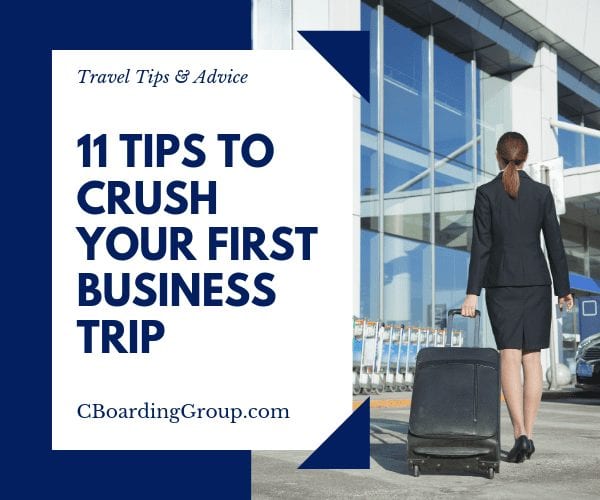
Definition of a Business Trip (and what to expect)
Let’s start first with a quick definition of what a business trip actually is. A business trip is nothing more than a visit somewhere for work purposes . This visit takes you someplace other than your normal “office” often places that require air travel to reach.
Maybe it’s to visit a customer for the purposes of selling them something. Or, perhaps it’s to attend a conference. Maybe it’s just for training. There could be a variety of reasons why your company is sending you out on the road. For our purposes, we are going to define a business trip in this context as including air travel (although many people drive for their business trips, we are excluding that here).
You can expect a few things to happen when you travel for work:
- The company will pay for your travel – you may have to pay first , but they will reimburse you (if they don’t…run away from that company)
- There’s likely a company travel policy somewhere – you should go read it. It will give you the rules of the road so to speak. For example, how much per diem do you get a day? Or do you NOT get per diem and need to keep track of every single meal receipt, etc. What leeway are you allowed in picking flights, hotels, etc. All of this will likely be covered in the company travel policy. If this is your first business trip…read it .
- You likely have to book your own travel – in many cases through a custom travel portal although some companies just use something like Travelocity or Expedia. Your travel policy is your guide here.
- You might be traveling with colleagues or alone . If traveling with colleagues it might be worth coordinating your travel itineraries with them. Often, however, the life of the road warrior is a solitary exercise. Just you, your carry-on, and another airplane seat.
Hopefully, that gives you a little insight into what to expect on your first business trip. By the way, other terms you might occasionally hear business trips or business travelers use/refer to that all more or less capture the same idea:
- Business Travel
- Road Warrior
- Travel for Work
Alright, let’s now shift this conversation to some detailed tips on how to slay your first work trip.
First Business Trip – Let’s Crush It
There are lots of different things you can do to make your first business trip go smoothly. Here are a few important suggestions worth taking into consideration for your first work trip:
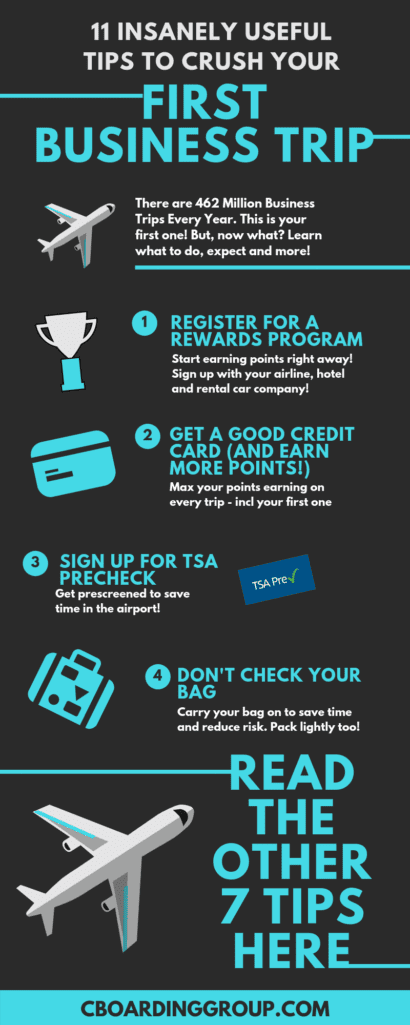
Tip #1: Register for frequent flyer programs .
It’s probably way too early to pledge allegiance to a specific airline, hotel, or rental car company, but you should go ahead and sign up for a few – especially the ones you intend on using on this trip .
All major travel companies offer rewards programs that allow you to earn miles or points based on usage (e.g. stays, rentals, mile/segments flown, etc).
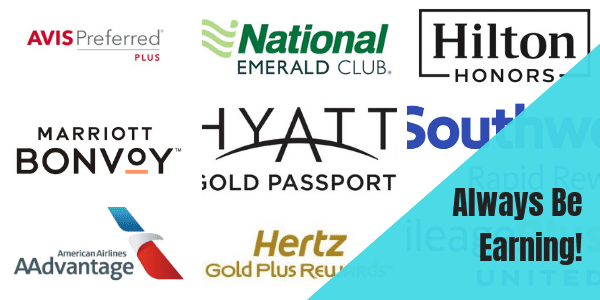
Even if you are not sure you will be traveling on a recurring basis (beyond your initial business trip) sign up anyway .
Get those points .
Many companies will allow you to transfer points to other programs so every little bit helps.
With the accumulation of points (or miles), you can start to redeem them for free trips, hotel stays, or car rentals (all of which can come in handy for the personal trip you might want to take later).
Moreover, with lots of usage (e.g. when/if you become a serious road warrior) you can earn status .
Status will help ease future travel adventures by giving you better boarding options, room upgrades, freebies like water and snacks, or even an upgrade to the convertible rental car.
As someone who’s on the road most weeks of the year, these little benefits start to add up and help make the business travel life (which can be less than glamorous at times) much more palatable.
Key takeaway: Make sure you sign up for the airline, hotel, and rental car rewards program. Often folks skip the rental car, but some of the programs (like National ) are really strong.
- Protip : Sometimes your company will have an arrangement with one of the travel companies that allows you to jumpstart your status. For example, at my last company , they had an arrangement w/ National Rent a Car that allowed me to jump right up to the first rung of the ladder – regardless of how many cars I’d rented. But, I had to sign up for it. It immediately allowed me to get some of the benefits of a normal frequent traveler without having to rent 69 cars over the course of the year (or whatever it was at the time).
Tip 2: Use your personal credit card – if you can – to get the points (or register for the rewards program with your company card) .
Your company might issue you a company card and if they do you may or may not get access to the points program. Either way, chances are you can qualify for a better rewards program w/ your own credit card (unless your credit is shite…lol).
Moreover, credit card companies routinely offer all kinds of programs to get you to sign up for their card. Southwest often offers giant piles of airline miles for their Chase Card (often enough for a free flight or two immediately!).

The folks over at Bald Thoughts might be worth a peek as they often aggregate and identify current credit card deals.
Whatever you do, do your best to use a credit card that gives you SOME sort of rewards for the trip. My trips often cost up to 2,000 or more for a week of domestic travel. Those are points that you’d be missing – even if it is just your first business trip.
Protip: If you can use a separate credit card – just for travel and separate from the rest of your monthly expenses it might make it easier to do your expense reporting. Hard earned lesson on my end from muddling through expenses picking out which was my Applebee’s meal in Denver vs my kids’ piano recital. 🙂
Tip 3: Sign up for TSA Precheck (if there’s time)
There simply may not be time to get this done before your first business trip actually gets underway, but IF YOU CAN… sign up for it . And even if you can’t get it done before your trip starts, do it anyway – you can use it on your next trip.
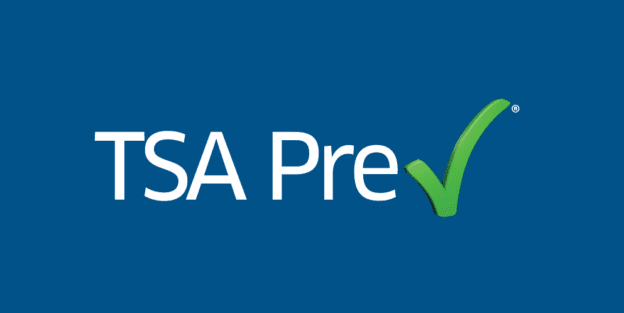
TSA Precheck is a pre-screening program offered by the US Department of Homeland Security . After a short application, a background check, a very affordable $85.00 fee (for 5 years!), and an in-person interview where you are fingerprinted you can get access to a separate airport security check-in line.
This line is almost always significantly shorter than the main security lines. It’s usually filled with business travelers…all of whom know what they are doing and move fast. AND…you don’t have to remove your shoes or take your gear out of your bags.
I’ve gotten through TSA Security checkpoints in literally 2 minutes before…where the normal line would have taken at least 20 minutes.
If you learn nothing else…do this . You can send me a Christmas Card later.
Tip 4: Don’t Check your Bag under any circumstances (which implies: don’t overpack!)
This is a major rookie mistake. As a young child, you probably went on a big vacation with your family at some point during which your dad probably lugged all of your giant suitcases out of your family’s mini-van and checked them.
Yeah…business travelers don’t check their bags – at least the smart ones don’t. Or at least, not very often .
Checking a bag simply adds more time to your trip because you have to wait in line to check your bag and then wait for it to come down the conveyor belt at baggage claim. It can easily cost you an extra 30 minutes or so each way and sometimes more.

Moreover, when you check your bag you are introducing risk into your trip. The risk that your bag might simply get lost, damaged, or something stolen from it.
Checking a bag also usually indicates that you overpacked. A common denominator in checked bags is that people simply bring too much stuff. A savvy business traveler knows that traveling light allows you to be more efficient.
It’s less wear and tear on your body lugging a larger bag around and you can almost always go quicker when you don’t check a bag. Running behind for your flight? If you don’t check your bag you can simply go straight to the security checkpoint saving valuable minutes.
And it stems from bringing too much stuff. You really don’t need as much as you think. Learn how to pack light, bring only what you need, and fit it into a piece of carry-on luggage.
- Speaking of good packing skills I recommend you check out our piece Packing Tips Every Traveler Needs to Know for some ideas on how to improve your packing game.
Caveat : While I strongly advise against checking a bag (like really, seriously, don’t do it), the truth of the matter is there are a few times when it might make sense:
- You are a traveling work technician and have a bunch of tools that probably are going to have the TSA checkpoint giving you the special treatment (or may just be prohibited from being in the passenger part of the plane)
- You are traveling for a conference and have the conference gear to lug around – sorry you gotta check that stuff as it’s always huge
- You are bringing your golf clubs – I occasionally do this.
- You are traveling for an extended period of time – like 2 weeks. Because of my packing skills, I can get a lot of clothing into my TravelPro Crew 11 Suitcase and my Knack Pack Backpack , but occasionally it’s too much and I have to check my bag. I hate it every time too.
- You have something medical to deal with. I once traveled with a colleague who had a very large CPAP. He chose to check it because it was just too much to deal with for his clothes, laptop, and machine.
Aside from those reasons you really ought to avoid checking a bag whenever possible. Since this is your first business trip start building good business traveler habits by learning to pack right , travel light and use a good carry-on and backpack configuration.
Tip 5: Bring a backpack – NOT a roller briefcase
When traveling for work you likely will be issued a laptop that will allow you to work more efficiently while on your trip. Fight the temptation to buy an old-school wheeled laptop roller briefcase.
Instead, buy a business-traveler-grade backpack. Something that is intentionally designed with safe laptop storage and the business traveler in general in mind. Personally, I use the Knack Pack (and I used to use the Ogio Metro Backpack and you can read my product review here .
For the female readers, you may find a backpack a little less practical and instead turn to a laptop/purse combo that offers style and function.
The key point here is you don’t need another thing to roll around. Instead get something you can sling over a shoulder and easily set on top of your rolling carry-on for easy airport navigation.
Additionally, if you are heading to a big city a backpack will be your salvation. Ever tried rolling a briefcase through the streets of NYC!?
Tip 6: Don’t overthink the “travel gear situation”
You might be tempted to run out and start buying travel gear like a travel pillow or packing cubes . Let me stop you right there.
You don’t need any of that crap . Perhaps you might at some point need some of it, but you need to learn to go fast and light on the road first before you start gearing up.
Let’s be honest. It’s your first business trip. You are not going to sleep on the plane. No pillow is needed. Packing Cubes? You are an adult…learn to pack your suitcase . Save the $$ for a nicer meal on the road.
Fight the temptation to waste money (and valuable packing space) on frivolous items.
You are also going to be tempted to go buy really nice luggage. Don’t do that either. YET.
If you actually become a serious road warrior, then yes, by all means, do that. Good luggage is critical (and I wholeheartedly recommend the TravelPro Crew 11) . But, if this is your first business trip and you aren’t even sure it’s going to happen all that often save the money.
The only additional gear you really need to get dialed in for your first business trip is a set of good headphones and a portable charger (like the Anker PowerCore 20100 which I review here ). Add a backpack and a suitable carry-on suitcase and you will survive just fine.
- Note: if / when you start really hitting the road hard it will become necessary to build yourself a little traveler’s first aid kit of sorts (stuff to deal with colds, headaches, etc).
Tip 7: Figure out your airline’s boarding process (and try to avoid a middle seat) .
Each airline boards their planes a little differently and since this is your first business trip you likely don’t have any “status” (see Tip #1 for clarification on what “status” is). Not having status means you might just get screwed on the boarding process if you are not paying attention.
For example, Southwest requires you to check in no earlier than 24 hours before your flight. If you wait for much past that time you will wind up w/ a C Boarding Pass (hence the name of this blog. Haha). If that happens it may be hard to find a spot for your carry on and you will likely ride middle seat which is never fun!
- By the way, speaking of Southwest you might be interested in checking out 14 Travel Hacks for Picking the Best Seat on a Southwest Flight
Other airlines board using boarding groups prioritized based on the class of your ticket and status. You might get your assigned seat, but not have anywhere to stow a bag. Not good.
Whatever airline you choose, go to their website and learn about their boarding process and adjust your activities accordingly. If you find yourself stuck in a middle seat read my guide on how to survive the middle seat .
Tip 8: Show up to the airport a little early .
It’s your first trip so you might be a little bewildered by the security process. Show up a little early to give yourself plenty of time to get through security.
Go to the TSA’s website and learn the screening rules and/or ask a colleague for any of their detailed security tips.
Tip 9: Review your company’s travel policy
Hopefully, you did this already – but just in case, make sure you review your company’s travel policy. It will give you critical information on what is allowed / not allowed while traveling for work.
I had a boss once that told me “If I ever need to fire someone I just look at their expense reports. I guarantee there’s a problem somewhere.”
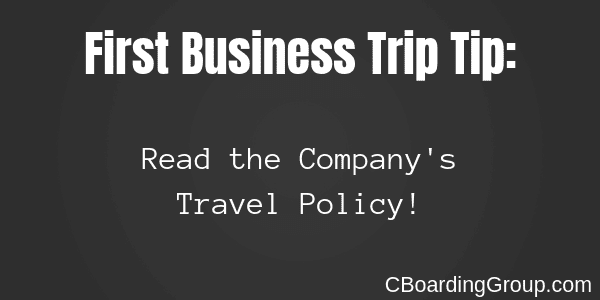
Not great leadership there…but a lot of truth. It’s hard to stay compliant sometimes with the company’s policy. Maybe you lose a receipt. Or forget that you can’t buy that employee a meal. Or maybe your meal was too expensive. You name it. Lots of places to really get sideways.
So, do your best to stay compliant and since this is your first business trip – read it 2x .
Tip 10: Keep track of your receipts (the expense report is coming!)
Speaking of company travel policies…
When you return from your first business trip you are going to have a fun little expense report waiting for you. Think of it as a visit to the dentist. Necessary…but never fun.
The expense report is your opportunity to submit all of the costs of your work trip to the company for reimbursement. The longer you wait to do this the more chance you might get stuck floating the bill with your own money while waiting for the reimbursement cash to come in.
So, get them done quickly. And while on the road, keep your receipts !
I recommend immediately taking a picture of them for easy uploading later. Some companies’ travel booking/expense systems may include mobile apps that allow for easier receipt tracking (like Concur ).

Other companies may have a sillier process…like filling out spreadsheets and mailing in physical receipts. Ugh! Lame…but I’ve done it.
Whatever the process, keep your receipts , and get that expense report done quickly when you get back.
Tip 11: Research the area before you go, stay safe, and get out (if you can)
Where else can you find an opportunity where someone else pays for you to travel!? How cool is that? Yeah, you gotta do a little work on the trip (or a lot…lol), but you are getting to visit someplace on this great earth !
With that in mind, take the time to research the area before you get there . I like to learn about the history of the area. Maybe you want to find out what the hipster coffee scene is. Or maybe it’s that cool diner you saw on the Travel Channel.
There’s stuff to do, places to see, food to eat, etc. You may not be able to squeeze it ALL in on this trip, but I bet you can get something in.
While you are researching here are a few other things to look up too:
- Weather – for packing purposes. No fun showing up with no coat.
- Safety Risks of the area you are visiting . Check the area around your hotel or final destination. If you are concerned about safety, you can read the 9 Travel Safety Tips to help you stay safe on your next trip .
- Your destination airport. After a while, you will get pretty good at knowing what to expect at certain airports. But for now, see if there’s anything unique about your destination airport (like the rental car facility is a 20-minute shuttle ride away or something).
A little research goes a long way!
**A Bonus Tip for your First Business Trip**
I am throwing in one extra for you – free of charge. My suggestion to you is this: have fun! You are gonna be a little nervous. And some stuff might go wrong – that’s ok. Have a laugh, we’ve all been there. Heck, I forgot to take a bottle of water out of my backpack the other…and here I am running a road warrior blog and making dumb mistakes like that. Doh!
Speaking of laughs, make sure to check out our travel memes over at our sister site which is full of some hilarious travel memes that once you get past your first business trip will really start to resonate. Like these:

Are you ready to graduate to the Advanced Road Warrior Class?
After you’ve slain your first business trip your head will be abuzz and if you are like me you will chomping at the bit to get back on your next work trip. If you managed to survive you might be ready to graduate to the advanced class!
My article, 147 Business Travel Tips is literally the largest list of business travel tips on the internet and it’s full of every conceivable tip you need to know to become a master road warrior. Read it and start #LevelingUp !
Final Thoughts on Crushing your First Business Trip!
I hope these first-time business traveler tips have been valuable to you. If you employ the tips we’ve pulled together here you will #slayingit on this first work trip.
- Are you traveling with your boss? Check out our guide to traveling with your boss here
So, go start packing! Enjoy that first business trip. We want to hear all about it so join the conversation below and leave us a comment!
Don’t forget to follow us on social media including Twitter , Instagram and Facebook .
Pin These for Later:
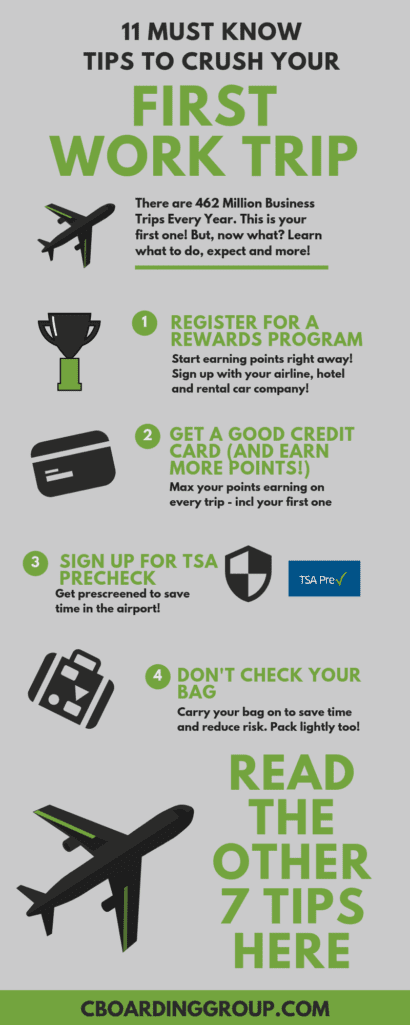
Affiliate Disclosure: As an Amazon Associate I earn from qualifying purchases. I may also earn commissions from other affiliate programs as applicable.
Jeremy Ballou is the editor of the CBoardingGroup.com and a long-time writer in both the travel and tech industry. Most days he's in thinking about travel or writing about it.
Passenger awakens to a needle in his side and becomes enraged
Panic ensues as oxygen masks incorrectly drop during a flight, you may also like, demon dentist freaks out and removes clothes at..., five days in slovenia: a guide to the..., can i fly with an expired license, what is a redress number and do i..., how to make your bed like a hotel..., how to stop your ears from hurting on..., the traveler’s first aid kit: how savvy business..., 11 tips on traveling with your boss –..., 23 jobs with travel: the ultimate list of..., deal alert: rockland wheeled underseat carry-on 72% off.
This life is very busy but this tour seems lovely as i read.
Leave a Comment Cancel Reply
Save my name, email, and website in this browser for the next time I comment.
- Share full article
Advertisement
Supported by
DealBook newsletter
‘This Could Have Been a Zoom Meeting’: Companies Rethink Travel
Before business travel fully takes off again, some companies are taking steps to rein it in.

By Kevin J. Delaney
The DealBook newsletter delves into a single topic or theme every weekend, providing reporting and analysis that offers a better understanding of an important issue in the news. If you don’t already receive the daily newsletter, sign up here .
David Calhoun, chief executive of Boeing, has access to company aircraft as part of his job. Even so, he told an interviewer that he didn’t expect to fly nearly as much for internal company meetings after the pandemic.
Mr. Calhoun, like some of his peers, found that video calls were remarkably effective for checking in with colleagues, allowing him to pack in more meetings and schedule them with minimal advance notice, according to an account in “Leading at a Distance,” a recent book by James M. Citrin and Darleen DeRosa.
“I will do as much or more customer travel, because that’s still the most important way to build relationships,” Mr. Calhoun told the authors. “But most travel when leading big companies is visiting your own teams. I won’t be doing that nearly as much.”
There’s broad consensus that how often we fly for work and what we travel for will shift significantly post-pandemic. Who is traveling may be different as well. That, in turn, will prompt changes in what the travel industry provides to business people, a source of nearly a third of its revenue before the pandemic.
A year and a half of forgoing virtually all travel and doing business by video conference has led many business people to conclude that a lot of their previous travel wasn’t worth the time and toll on their bodies and mental state, on their families and the environment. That’s even before considering the role that travel played in transmitting the virus across continents.
There’s a popular meme : “This meeting could have been an email.” Those of us who have traveled long distances for a single work meeting know that we could often just as easily say, “This business trip could have been a Zoom call.”
And before travel fully takes off again, some organizations and individuals are taking steps to rein it in. Adding significantly to the pressure are commitments that many companies are making to trim their emissions — goals that often involve slashing the carbon footprint of employees’ business travel.
One scenario is what Mr. Calhoun suggested: Companies could dramatically reduce whole categories of travel, such as in-person meetings with internal colleagues in other cities. A Wall Street Journal analysis last year, for example, estimated that intra-company meetings and training represented 20 percent of all business travel and predicted that 40 to 60 percent of that would go away permanently. The Journal concluded that 19 to 36 percent of business trips would disappear. Bill Gates predicted at DealBook’s conference last fall that business travel would still be more than 50 percent lower once things normalized.
In contrast with domestic leisure travel, which has largely recovered , business travel has been relatively slow in coming back. Just 9 percent of companies say they’ve resumed their pre-pandemic travel levels, according to a recent survey by the Association of International Certified Professional Accountants. United Airlines and Delta Air Lines both recently said that business travel remains about 60 percent lower than pre-pandemic levels, despite an increase in recent months. Rising coronavirus cases in recent weeks could delay the recovery of business travel further.
But Mr. Calhoun’s plan to reduce his own internal travel echoes the results of the accountants association’s survey, which found that two-thirds of companies were allowing travel for sales or client meetings, with fewer permitting travel for internal purposes or training programs.
The rebound
Early indications suggest that most businesses will be reluctant to dramatically trim the estimated two-thirds of business travel that involves sales calls and client visits, conferences and professional services like consulting. Executives remain wary of losing out to a rival who actually shows up in person, or seeing an important contract go away because of poor virtual communications. Jamie Dimon, the chief executive of JPMorgan Chase, said in May that clients told him his bank lost business when “bankers from the other guys visited, and ours didn’t.”
Scott Kirby, chief executive of United, earlier this year predicted “full recovery in business demand because business travel is about relationships.” Speaking with investors via a conference call, he added, “You cannot build human relationships through a medium like this.”
Others also see the potential for corporate travel to swell, as increasingly dispersed workers need to reassemble regularly.
“The thing that we describe as business travel may actually grow in the future years,” said Lindsay Nelson, chief experience and brand officer at Tripadvisor, the online travel company. “But the kinds of people that are traveling and what they’re traveling for is going to change.”
Ms. Nelson predicted that remote-work arrangements mean that more employees will travel back to their corporate offices. So rather than an elite subset of employees flying out from a headquarters constantly, a greater percentage of workers will be flying into headquarters or offsite meeting locations to convene with each other.
Such a shift could lead hotels and airlines to rethink their loyalty programs, which have typically catered to the intense road-warrior traveler, to attract the business of regular, but less frequent travelers. Ms. Nelson said that such travelers might look for different perks, such as an extension of the flexible flight cancellation terms that prevailed during the pandemic. Another trend the industry could cater to: Nearly 90 percent of business travelers surveyed by SAP Concur recently said they plan to attach personal vacation time to their business trips in the next year.
The rethink
But rather than just accept that business travel will rebound, companies can use the change in practices of the past year to open a new chapter for how they approach it. A compelling reason for doing so is the environmental impact, especially as organizations pursue reductions in their climate footprints.
Commercial air travel is responsible for about 3 to 4 percent of total U.S. greenhouse gas emissions . First-class travel, because of the lower density of seating, can result inasmuch as four times the emissions as sitting in the back of the plane.
At the Zurich reinsurance company Swiss Re, for example, flights represented about two-thirds of its operational carbon footprint. As part of its net-zero emissions efforts, the company used the drop in corporate travel last year as an opportunity to more permanently reduce its carbon footprint. Its employees’ air travel fell about 80 percent from 2018 levels last year and it expects a drop of 30 percent or more from the 2018 baseline this year.
Swiss Re in January began adding a significant carbon emissions surcharge onto flights purchased by its 13,200 employees — representing roughly $500 on top of the price of a Zurich to New York plane ticket. Team budgets can absorb these charges — which Swiss Re uses to fund carbon offsets and removal — since its employees are flying less.
But as travel comes back and the surcharges pinch into budgets, the goal is to force employees to think harder when they’re booking a trip about whether it’s actually necessary.
“We still need to travel to meet clients — but maybe not as frequently,” said Mischa Repmann, senior environmental management specialist at Swiss Re. “We can merge trips, we can travel more mindfully than in the past.”
Other companies are heading in a similar direction. Salesforce in April announced plans to cut its own business travel carbon emissions as a ratio of its revenue by 50 percent from 2019 levels. Deloitte unveiled a goal of cutting business travel emissions per employee by 50 percent by 2030 . EY’s goal is to cut business travel emissions by 35 percent from fiscal year 2019 to 2025.
In addition to reducing the number of flights, businesses are using calculators to determine the least emissions-intensive locations for meetings, such as ones some participants can reach by train. And some are experimenting with “ cluster meetings ,” where attendees assemble in nearby hub locations and connect virtually with those in other regional clusters.
The environmentalist and author Paul Hawken calls flying long distances for business meetings “a catastrophically monumental waste of resources” and argues that companies would do better with less corporate travel. “We just got a good lesson in how to be effective without moving protoplasm around,” he said.
It would be easy for organizations to revert to their old practices, and probably many will. But their environmental targets will push some companies to rethink who travels and why. And while we know well the limits of video meetings, there are compelling reasons to forgo some travel and resign ourselves to settling in on Zoom.
Mr. Delaney is co-founder and editor in chief of Charter , a media and services company focused on transforming workplaces.
What do you think? Should companies cut back on business travel indefinitely? How? Let us know: [email protected] .
Explore Our Business and Tech Coverage
Dive deeper into the people, issues and trends shaping the worlds of business and technology..
Elon Musk’s Mars Colony: The tech billionaire has directed employees at SpaceX, his rocket company, to drill into the design and details of a Martian city. Here’s what’s being discussed .
A Futile Fight: Researchers have learned plenty about disinformation and how it spreads. But they’re still struggling to figure out how to stop it .
Enter the Burnout Coach: As chronic work stress climbs, entrepreneurs are finding opportunities in the burgeoning space of burnout coaching .
Throwing a Deductible Party: For some people dealing with high health care costs, small wins, like meeting a deductible or paying off a medical bill, have become sufficient reasons to party .
Ferrari Joins the E.V. Race: Growth in electric vehicle sales has been slowing, but the Italian carmaker is stepping up investment and setting ambitious targets .
- Search Search Please fill out this field.
- Corporate Finance
Corporate Business Travel: Everything You Need to Know
:max_bytes(150000):strip_icc():format(webp)/Headshot-4c571aa3d8044192bcbd7647dd137cf1.jpg)
Katie Miller is a consumer financial services expert. She worked for almost two decades as an executive, leading multi-billion dollar mortgage, credit card, and savings portfolios with operations worldwide and a unique focus on the consumer. Her mortgage expertise was honed post-2008 crisis as she implemented the significant changes resulting from Dodd-Frank required regulations.
Corporate business travel involves the movement of individuals representing their organizations for work-related reasons. Whether it’s attending client meetings, industry conferences, or sealing business deals, this practice covers a range of activities essential for professional growth.
In the interconnected global business environment, where face-to-face connections matter, corporate business travel plays a central role in sustaining and expanding enterprises across borders. Businesses face challenges in optimizing this crucial element of their operations. Strategic considerations must be taken into account to use this element of business to its greatest potential.
Key Takeaways
- Corporate business travel can unlock new opportunities for business growth, offering the possibility of reaching new markets, connecting with a wider pool of prospects, or developing brand presence and reputation.
- Traveling for business has many benefits for individuals as well, providing them the chance to meet fellow employees, grow their career by participating in different opportunities, and network within the industry, not to mention experience new destinations.
- Business traveler safety and security are top priorities during corporate travel.
- To ensure that travel goes smoothly and stays within budget, companies should implement corporate travel policies and best practices for employees traveling on behalf of the company.

Importance of Corporate Business Travel
There are many business-related reasons to travel. It can encourage team building, promote learning, offer different perspectives, provide connection to a wider network, open up new markets, and drive sales. And whether or not the trip is for a specific purpose (such as a conference or a retreat), the benefits for employees and companies alike can extend beyond the stated intent of the trip, building confidence, cultural competency, relationships, and company reputation.
Many employees consider the opportunity to travel for work a desirable job perk, as it can offer the chance to venture somewhere that they may not ordinarily go, or to have a trip paid for by their company. And although expenses are associated with travel from a corporate perspective, they may be well worth the return on investment in terms of potential leads or sales—plus, many travel expenses are tax- deductible .
Types of Corporate Business Travel
Corporate travel can take many forms, including the chance for employees and executives to attend events, such as meetings, conferences, industry networking sessions, and fairs. Or a trip may take advantage of educational opportunities such as training sessions, seminars, and workshops. Retreats and guided trips can make for valuable team-building time in new contexts that unlock different perspectives and strengthen working relationships.
Businesses may send their employees to a different location to network, sell, teach, learn from, or generally connect with external contacts or internal employees in regional offices, or to act on behalf of the company in some way.
Additionally, from a client perspective, business travel may occur as a form of due diligence , ensuring that your vendors or suppliers are legitimate, legal, and compliant organizations—for example, traveling for regular audits to confirm that what you think is happening at your supplier organizations is actually happening.
Creating a Corporate Travel Policy
From a company perspective, travel can be a challenge to administer and manage . Costs can easily balloon out of control; travel logistics can be time-intensive to arrange; employees traveling on behalf of the company must be granted a great deal of trust; and like any form of travel, business travel can open up risks to safety, security, and health.
No matter the size of the business or the frequency or complexity of travel, a corporate travel policy can be a helpful tool for any company to set expectations for its employees, communicate guidelines and processes, keep expenses within budget, and streamline booking and logistics.
In creating a corporate travel policy, companies might consider the following for both domestic and international travel, as applicable:
- Purpose(s) of travel
- Which employees are eligible to travel
- Booking and expense approval processes
- Risks and liabilities of travel and how to manage them
- Expectations for employee behavior, including acceptable and secure uses of technology, personal vs. leisure time, communication, and entertainment while traveling
- Eligible expenses for employees while traveling, including per diem rates if applicable
- Determine if employees will be reimbursed for their expenses or given a corporate credit card to use
- Financial tracking, record-keeping, and reimbursement processes
- Acceptable booking practices and costs, including preferred agents or vendors
- Travel insurance
Of course, policies must also be communicated and enforced to ensure compliance and fairness. Including a travel policy as part of a corporate handbook or reviewing it in an onboarding or training module can be a good way to ensure that all employees receive and understand the information. Making it easily accessible for future reference on a shared drive or company portal will encourage employees to refer to it often.
Business travel managers estimate, on average, that spending on domestic and international corporate travel is at 77% and 74%, respectively, of where it was before the COVID-19 pandemic.
Setting a Corporate Travel Policy
:max_bytes(150000):strip_icc():format(webp)/GettyImages-14013409352-16063b976ed14512837ca0fe8bdc536d.jpg)
Corporate Business Travel Best Practices
There are many best practices that both employees and companies can keep in mind around corporate business travel to ensure that it is a successful experience. These encompass everything from administration and financing to employee behavior and well-being.
Booking Corporate Travel
Booking travel can be labor-intensive and time-consuming. To improve the booking process, save on costs, and streamline expense reporting, it can be helpful to designate preferred travel agencies, online platforms, vendors, and lodgings for employees and executives to book with. If the size of the company allows, it can also be helpful to hire an employee or team specifically to oversee and administer corporate travel, or designate this duty as part of an employee’s broader job description.
Managing Travel Expenses and Budgeting
There are many financial considerations when it comes to corporate business travel, and expenses and budgets must be carefully managed to keep costs under control. Many travel expenses are tax-deductible and can be written off, representing potentially significant savings for a company. Setting a budget and clear guidelines for employees about what can be an expense and what cannot is a must, as is creating and enforcing policies and procedures around tracking and reporting expenses.
Many corporate credit cards offer travel rewards and cost-saving opportunities for business travel, as do many other vendors and suppliers in the corporate travel industry. Businesses can take advantage of these to reduce inefficiencies and save on costs.
How to Manage Corporate Travel
:max_bytes(150000):strip_icc():format(webp)/corporate-travel-management-8423577-FINAL-1-9ca54d5ea8c4442fada3f4af55aaab5a.png)
Ensuring Traveler Safety and Security
As with any trip, business trips are not without safety and security risks, including the potential for political or civil unrest, crime, illness, injury, accidents, emergencies, natural disasters, cybersecurity breaches, or theft.
To protect their employees against unexpected and undesirable circumstances, at a minimum, businesses will want to have a travel insurance plan in place. It’s also helpful for businesses and employees to undertake some form of travel risk assessment to aid them in navigating potential risks, and outline safety and emergency preparedness guidelines within a corporate travel policy.
Employees should also know how to call if something goes sideways, such as hotel booking issues. A travel agent? A supervisor? If there’s a hurricane, you don’t have a car, and your flight is canceled, can you book another last-minute flight to get around the weather to get home? These details should be planned ahead for.
Maximizing Productivity During Business Trips
The overlap of business and leisure, sometimes referred to as “bleisure,” is one of the main draws of corporate business travel. However, there can also be pitfalls associated with this gray area. It can be difficult to stay productive while working remotely, whether due to the many distractions of a new environment (positive and negative), or because the trip entails an increased workload or time spent away from day-to-day job duties.
Employees looking to manage their time efficiently while away should get clarity on the intended purpose and expected outcome of their trip, and their employer’s and teammates’ expectations for their workload and communication frequency. They can also plan ahead to make the most of their travel time and downtime, and anticipate time zone differences to ensure smooth communication and adjustment to jet lag.
It’s important for employees to maintain work-life balance while traveling on behalf of work. Researching food, entertainment, and fitness options and preparing accordingly can pay off in terms of mental and physical wellness, especially for frequent travelers.
Tips for Business Travel Etiquette
Traveling anywhere, whether domestically or internationally, comes with responsibilities and expectations regarding employee behavior. Perception is one of the most important factors to remember when traveling as a representative of your company. You represent your company out in the public, so you need to ensure you’re displaying any key values that your company represents when interacting with vendors, clients, and peers.
This applies to cultural sensitivity as well. Travelers should do research in advance of their trip to ensure that they can be mindful of local customs and professional etiquette and behave with awareness and respect. Even the basics, such as learning appropriate forms of greeting or how to handle money and payment, and committing a few common words or phrases to memory can go a long way toward demonstrating good intentions and building a new relationship across cultures.
Sustainable and Responsible Business Travel
Recognizing that corporate travel can have a negative impact on the environment, many businesses and individuals are reexamining their travel practices and policies to see where they can make improvements. One example is reducing emissions by booking different means of transportation when possible. In general, seeking out vendors or companies that promote sustainable travel practices and responsible tourism, and that support local communities and ecosystems, can be a good first step to reduce environmental impact.
Technology and Tools for Corporate Business Travel
Software and technology tools can be immensely useful across all aspects of corporate business travel. Travel management and booking platforms; apps for tracking expenses, navigation, or converting currency; and translation and communication tools are all things that employees and businesses alike can take advantage of before, during, and after traveling.
When it comes to technology, it’s important to account for cybersecurity risks and only bring what is necessary to reduce the potential impact of damage, loss, or theft.
Managing Business Travel Expenses
:max_bytes(150000):strip_icc():format(webp)/GettyImages-652153847-592422645f9b58f4c07fcb7a.jpg)
What Is an Example of Corporate Business Travel?
There are many work-related reasons to travel, but many businesses will have their employees travel for conferences, events, sales and networking, seminars, meetings, team building, retreats, and to open up new business growth potential.
How Does Corporate Business Travel Work?
Corporate travel is simply travel for business-related purposes, so the nature of the trip will depend on its length and purpose. Companies whose employees travel frequently on behalf of the business should consider creating a corporate travel policy with information and guidelines for their employees.
Who Handles Corporate Business Travel?
Some businesses employ internal teams or individuals to manage corporate travel and business trips. At other times, employees are responsible for making their own arrangements within guidelines laid out by the company. There are also corporate travel agencies that businesses can leverage to streamline and optimize their bookings and costs.
The Bottom Line
Corporate business travel can be an invaluable path to both business growth and individual career development, building strong relationships and teams. No matter what form it takes, it’s prudent for companies to collect, implement, and communicate best practices for business travel to their employees in a company handbook or corporate travel policy. This should incorporate areas such as expense and booking management, safety and security, productivity, sustainability, technology, and employee behavior and etiquette.
Michela Buttignol / Investopedia
Internal Revenue Service. “ Understanding Business Travel Deductions .”
Global Business Travel Association. “ GBTA Business Travel Industry Outlook Poll .”
Harvard Business Review. “ How to Work and Travel at the Same Time .”
- Terms of Service
- Editorial Policy
- Privacy Policy
- Your Privacy Choices

19 Business Travel Tips for Frequent Corporate Travelers
Whether it’s been a while since you’ve engaged in corporate travel or you’re a first-timer, you might benefit from these business travel tips.
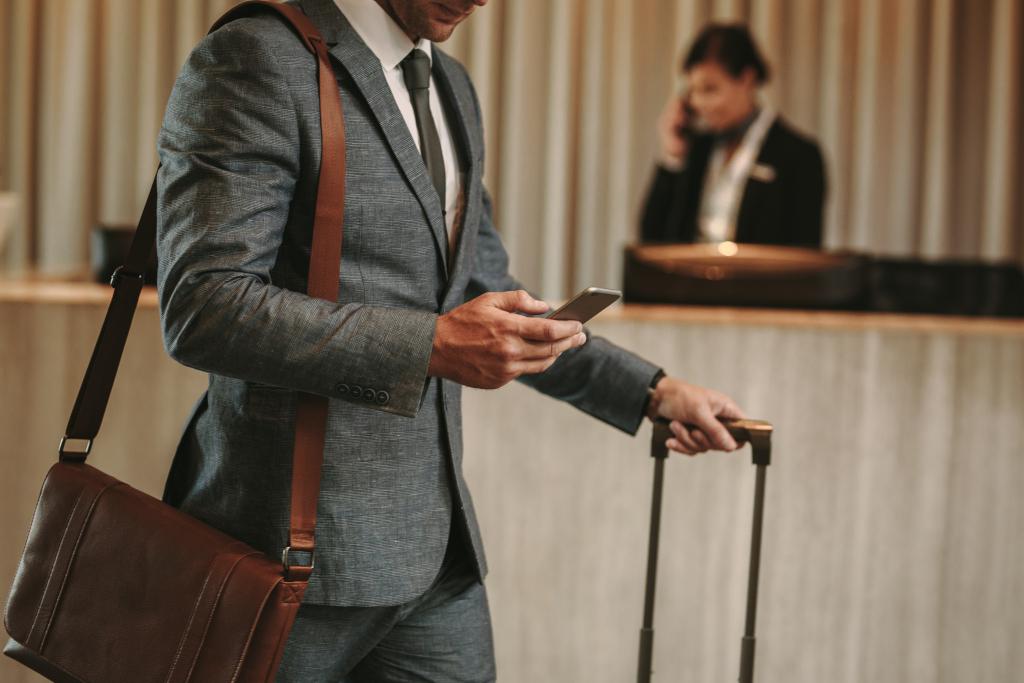
With the rise of video conferencing and other technological tools that help us to connect from afar, it’s easy to assume that traveling for work is a thing of the past. That’s certainly not the case! There are many reasons that people still need to make their way to remote offices and distant locations to get the job done. Whether it’s been a while since you’ve engaged in corporate travel or you’re a first-timer, you might fit from some business travel tips.
Gather the Team Together for a Scavenger Hunt
If your company is holding an annual conference or training event, consider a team-building event customized by the experts at Let’s Roam! We offer over 20 team-building activities , including virtual and hybrid events for those unable to engage in business travel. Contact us today to find out how we can help you plan effective exercises just for you and your crew!
Things to Do Before You Leave Home
Whether you’re a frequent traveler or you’re about to embark on your first-ever business trip, you should do a few things before you leave home. It’s never a good idea to travel for work without making arrangements in advance. If you travel on a whim without making any preparations, you may end up missing critical meetings, leaving something vital at home, or without a place to stay.
Book with Familiar Providers
Whenever possible, book reservations with airlines, rental car companies, and hotels that you’ve frequented before. By doing so, you’ll be familiar with how things work and the level of service you can expect. For example, you’ll know the terminal you’ll depart from and return to if you make reservations for your next business trip with your usual airline.
If you read travel blogs, you might be advised to bundle all your travel plans with one service provider, such as Expedia, Travelocity, or Priceline. While that can streamline the reservation process, it’s also a risky endeavor if you need to change your plans down the line. Even if you’re successful at changing your plans, you may end up paying a premium or you might not get a full refund if you shorten your stay or return your rented vehicle early.
Sign Up for Rewards Programs
Like your local yogurt store might give you a punch card that will entitle you to a free dessert after you collect ten punches for verified purchases, businesses in the hospitality industry often have loyalty programs that enable frequent business travelers to accumulate points they can later redeem for savings. You don’t have to travel often for these programs to benefit you.
Signing up for rewards programs is somewhat akin to offering future business to a provider. When you’re a member of loyalty programs, you may enjoy some perks like an upgraded seat, hotel room, or vehicle even if your rewards balance is zero because the provider wants you to use its services again down the line. In other words, providers may try to woo you with free upgrades to get you to book with them again.
Members of rewards programs often enjoy more conveniences, too. A rental car company may deliver your rented vehicle to you if you’re a member of its loyalty program, for example, while non-members may have to take the dreaded shuttle ride over to the company’s hub to get their automobiles.
Follow Your Company’s Travel Guidelines
Depending on the business you work for, your company may have a travel policy. If your organization has such a policy, make sure you make arrangements that are in keeping with those guidelines. The travel policy may require you to use a travel credit card instead of your own personal credit card if you want to be reimbursed for expenses incurred during your work trip. You may only receive a limited stipend for meals, too.
A typical travel policy varies from one company to another. Even frequent business travelers should review their company’s travel guidelines regularly to ensure they remain in compliance and won’t have to come out-of-pocket for non-reimbursable expenses unexpectedly.
Store Customer Service Numbers in Your Phone
As you firm up your travel plans, make sure you store the relevant customer service numbers in your phone. Having those numbers handy will be a big help if your plans get disrupted or you’re dissatisfied with the service you receive for any reason.
One of the best travel hacks you’ll ever receive is to follow your providers on social media. By following your airline, rental company, and hotel on social media, you won’t miss out on any promotions they offer. Some hotels share exclusive passwords on their social pages. If you use the designated password when you check-in, you may be privy to free perks, such as:
- In-room movie
- Hot chocolate kit
- Bottle of wine
- Preferred parking
- Drink or meal vouchers
- Room upgrades
Depending on the carrier or hotel you book with, you may be able to solve customer service issues on social media, too. If you tweet at an airline because you missed a connection or got bumped, you may be able to resolve the issue on Twitter and avoid waiting in line at a kiosk with the rest of the weary masses.
Dress Smartly
How you dress on the day you travel matters. If you dress professionally, it’ll make it more likely that you’ll receive preferential treatment and perks that can make your trip markedly more pleasant than it would be otherwise.
In addition to dressing well to possibly enjoy some benefits, you should dress with the TSA security check in mind. To make getting through security less of a hassle for you and everyone in line behind you, don’t wear a belt or metal accessories except for your wedding ring. Don’t forget to wear slip-on shoes so you can remove them and put them back on quickly without causing a traffic jam that will prevent you from winning any popularity contests.
Even if you book a direct flight, which is always a good idea to avoid oft-wasteful layovers, you may still wind up spending time in the airport lounge. Pick an outfit that will allow you to fit in during this travel time rather than making you stand out for all the wrong reasons.
Remember, there’s always a chance that you’ll run into one of your peers, competitors, or clients before you reach your destination. Always dress to impress with practicality and comfort driving your clothing choices.
Reserve Select Toiletries for Travel
You don’t need to be a frequent flyer to know that there are few things worse than arriving at a destination for a business meeting only to discover that you forgot your deodorant, conditioner, or favorite toothpaste at home. Having your preferred toiletries on-hand can be the difference between a successful work trip and one that literally stinks.
To ensure you’re comfortable during your trip, grab a small tote and fill it with all the toiletries you’ll need whenever you travel. Don’t use the items in that tote unless you’re traveling and replenish your supplies as they run out so you won’t have to rush around at the last minute before your next business trip.
Do you absolutely, positively need a certain item that you know you can’t travel with like a particular razor or aerosol spray? If so, consider ordering what you need from Amazon and having it shipped directly to your hotel before you arrive on-site. Be sure to alert the hotel about your package so the staff will know to keep an eye out for it and have it waiting for you in your assigned room.
Stick with Carry-On Luggage
Unless you’re going to be away from home for months at a time, you should do your level best to pack light. When you pack light, you’ll be able to avoid having to check bags, which can save you money and prevent delays waiting for stowed luggage to make its way to the baggage terminal.
Check with your airline to see how big your carry-on bag can be. Carry-on luggage is normally smaller than suitcases that are stored under a plane’s seating area, so start thinking in the realm of backpacks. As you pack, make sure you include an extra set of clothing among your things in case something spills on you during your flight.
You should also put essential items where you can access them easily. Rather than stuffing them at the bottom of your carry-on bag’s main compartment, put them in a separate pocket that you can lock.
If you’re traveling with a laptop, you’ll need to remove the device from your bag as you go through the TSA security checkpoint. Keep that in mind while you pack so you don’t bury your computer and charger underneath delicate items you’d prefer the public not to see, such as your underwear.
Are you going to pack clothing that needs to be wrinkle-free when you arrive at your destination? You may want to bypass your carry-on and stow them in a suit bag. Alternatively, you may want to wear the outfit on your travel day to keep it as wrinkle-free as possible.
If you don’t want to wear your good outfit on the plane and you’re required to check a suit bag, roll your clothes to keep wrinkles at bay. In addition to preventing wrinkles, rolling your clothes will enable you to fit more in your carry-on.
Pack Healthy Snacks
Too often, a business trip involves irregular mealtimes and unhealthy food choices. Even when you’re traveling in business class or first class, your meal options may only include processed foods that are devoid of taste and substantive nutrition.
You can avoid allowing yourself to get sucked into a food coma by preparing some delicious and nutritious snacks for long flights before you leave home. If your trip requires international travel, you can bypass a hassle at customs by ordering healthy snacks from Amazon and having them sent to your hotel.
Register for TSA PreCheck or Global Entry
Do thoughts of having to go through airport security turn your smile into a frown? If that’s the case, know you’re not alone. Luckily, you can turn your frown upside down by signing up for TSA PreCheck. Created by the U.S. Transportation Security Administration, TSA PreCheck allows registered travelers to sidestep certain security measures to expedite the airport screening process.
If international travel is a must for you, it might be wiser for you to sign up for Global Entry. This program also hastens the screening process, and it enables you to get through U.S. Customs faster when you re-enter the United States as well.
Both programs charge a modest fee for a five-year membership. If you find the cost of membership off-putting, contact your travel credit card provider to see if the bank offers a credit you can apply to cover the cost of registering in one or both programs.
What to Do During Your Business Travel
While business travel is different today than it was just a few years ago thanks to changes thrust upon the world as the result of the pandemic, some basic rules will always apply. One of those rules is to be courteous and compliant with an airline’s requirements. If, for example, your carrier requires passengers to wear a mask, do it, making sure you cover both your nose and mouth.
Everyone is tired of wearing masks, not just you. There is no point in giving an airline attendant grief because you don’t want to mask up. Similarly, it’s not your responsibility to chastise someone for not wearing a facial covering. Although you may think you’re being helpful, instructing someone to put a mask on can cause problems for airline attendants and other passengers, so let the professionals handle non-compliant travelers.
Another timeless “rule” of traveling is to familiarize yourself with the dos and don’ts of airline travel . Being familiar with these guidelines and adhering to them will ensure you’re viewed as a best-in-class passenger, which is definitely the reputation you want to have as a business traveler.
Book Your Seat at the Last Minute
Cancellations and seat changes are the norm for most flights. With this in mind, wait until about 30 minutes before takeoff to book your seat. By waiting until your flight is just about ready to board, you can increase the odds that you’ll reserve the best seat currently available. In other words, waiting to book your seat is kind of like giving yourself an upgraded seat in many cases.
Drink Water Instead of Booze
A lot of leisure and business travelers consider an airplane ride to be a great time to indulge in an adult beverage, two, or more. You should resist the temptation to do the same, especially if you need to get right down to business when you land.
Even if you’ll have a few hours to yourself when you reach your destination, you should still refrain from drinking during your travel time. Staying hydrated is a must if you want to avoid jet lag, so skip the booze and drink bottled water instead.
Sitting for long periods of time can negatively influence your circulation and it can result in neck or back pain. To keep your blood flowing and avoid a painful back or neck, stretch periodically during your flight. Be careful to not infringe on anyone else’s space when you stretch unless you like getting dirty looks and being on the receiving end of wisecracks.
Set Yourself Up for Success During Layovers
If you have to change planes during your business trip, use the time between flights to set yourself up for success. Connect to the secure Wi-Fi in the airport lounge and get caught up on work communications like emails. Check industry news outlets for any breaking news so you’ll be up to date when you arrive at your final destination. Doing these things is particularly important if you have to walk into a business meeting shortly after your next plane lands.
Once you’re caught up with work, use your cellphone to download some music, movies, or television shows. Once they’re downloaded to your device, you’ll be able to watch and listen to the programs even if you end up having to spend some extra time in a space that doesn’t have a Wi-Fi connection.
Are you planning to catch some shuteye during your connecting flight? Visit one of the airport’s retailers to look for things that can facilitate sleep, such as an eye mask and some quality earplugs. Resist buying a travel pillow or anything else that’s too bulky to fit into your carry-on. Adding bulk or too much weight to your carry-on is the last thing you want to do during a stopover.
Like staying hydrated can help you avoid jet lag, so can exercise. If you have some free time between flights, consider booking a training session for the morning or early afternoon on the day you’ll arrive at your destination to offset the effects of jet lag. Refrain from scheduling a workout in the evening or the session may negatively affect your ability to adapt to a different time zone and a new schedule.
Keep Your Boarding Pass to Yourself
Whenever you’re on a work trip, keep your boarding pass private. Even if you use a Sharpie to block out the numbers on the pass, people can still steal personal data if you share pictures of your pass on social media. The QR code on your pass contains sensitive information. If that information makes it into the wrong hands, it could compromise your identity and even your safety.
Use Your Own Charger
Many airports and hotel business centers have public charging stations. While public charging stations are convenient, they’re also dangerous. That’s because people can swipe information like your credit card number from your electronic devices via USB. To keep your information safe, bring your own charger or use a USB data blocker if you have no choice but to use a public charging station.
Save Your Receipts
Does your employer reimburse you for the expenses you incur during a business trip? Do you itemize your federal taxes? In either case, you should save all your receipts. It’s also wise to use your cellphone to take pictures of your receipts as you get them in case you lose the paper receipts.
Steps to Take After Business Travel
You may think the work is done when you return home after a business trip, but that’s normally not the case. There are still a few things you’ll need to take care of.
Report Your Expenses ASAP
It’s easy to put off completing an expense report, but you shouldn’t. Fill out your expense report as soon as you can while your expenses are still fresh in your mind. You’ll be more likely to notice discrepancies or missing charges if you complete your expense report sooner rather than later. Also, you’ll get your money back that much faster.
Send Thank You Notes or Emails
At the earliest opportunity, you should send thank-you notes or emails to everyone you met with during your trip. Although emails are quicker, handwritten thank you notes are often perceived as more thoughtful and personal.
Connect with Family and Friends
When you return from a business trip, especially a prolonged one, prioritize reconnecting with your friends and family members. Planning a virtual game night with Let’s Roam is one simple way you can reconnect with loved ones no matter where they’re located.
Frequently Asked Questions
Avoid falling prey to rookie mistakes, like going rogue, booking the cheapest flight or hotel, and not tying up loose ends at the office. These business travel tips should keep you on track!
There are many things to remember when traveling on business . For starters, re-read your company’s travel policies, try to tie things up at the office before you leave, and travel as lightly as possible.
Follow business travel tips from the experts! Adhere to your company’s travel policies, save your receipts, stick with carry-on luggage, if you can, and stay connected with loved ones !
Need help planning a team-building event?
Schedule a quick, complimentary 15 minute chat with an event planner to book your next team building event with breeze., featured products & activities.
More From Forbes
The Future Of Business Travel
- Share to Facebook
- Share to Twitter
- Share to Linkedin
One of the defining features of the coronavirus pandemic for working professionals has been the huge growth in communication via platforms such as Zoom. Where previously workers would meet face-to-face, the shutdown in travel and of workplaces has forced so many of us to converse virtually instead. With conferences also heading online, the business travel market has ground to a halt as people have learned to communicate without jumping on a plane to do so.
This shutdown of business travel has huge commercial implications for airlines, for whom business travelers are believed to make up around 12% of passengers, but an incredible 75% of profits. Understandably, the industry is keen for things to get back to normal as quickly as possible, and in July, a survey of GBTA members found that nearly half expected domestic business travel to resume again in the United States by autumn. Only a third believed it would take six months or more. Of course, international travel is different entirely, with the likes of Qantas suspending all international flights and many borders shutting for prolonged periods.
While there has been a reticence to return to the office after COVID-related shutdowns, there is no such reluctance to hop on a plane for conferences or in-person meetings. This is due in large part to the clear advantage of conducting business interactions face to face. For instance, it’s well known that there are various benefits to communicating in person, with even a simple handshake often crucial in forging a bond with someone that underpins cooperation.
Commercial importance
It’s also hard to under-appreciate the importance of business travel to the economy. A study from Oxford Economics found that $12.50 of additional revenue is generated for every $1 spent on business travel. A second study , from Harvard’s Growth Lab, also underlined the vital role business travel plays in the economy.
The research shows that tacit knowledge is crucial to economic growth, and this is being undermined by virtual communication. The researchers used transaction data from Mastercard to map the flow of business travel around the world, and in the process created a Knowhow Index that they believe maps the incoming and outgoing knowhow in every country.
Trump Assassination Attempt: Here’s What We Know
The perseid meteor shower begins today: when to see it at its best, apple iphone 16 pro design upgrade promises key feature boost, report says.
“We’ve been puzzled by the fact that business travel has been growing faster than world GDP, despite the widespread adoption of alternatives like Skype, FaceTime, email, etc.,” the researchers say. “We posited that maybe there is a difference between moving information and moving brains. We obviously never imagined a complete shutdown of business travel, but the paper allows us to delve into the consequences.”
They concluded that the mobilization of know-how has a huge impact on the economy of nations, with a reduction in business travel contributing to a fall in global GDP of nearly 5%. Despite the evident advantages of a return to normal, the enthusiasm is not felt by all would-be business travelers.
For instance, in Europe, there has already been evidence of people switching from planes to trains for journeys, especially when sleeper cabins offer privacy. In the United States, there has been a similarly lukewarm return to air travel, with the industry now not expecting a return to pre-COVID levels before around 2024.
Bouncing back
The prospects of a bounce-back remain strong, however, not least as the evidence to date suggests that transmission rates from flying are lower than various other forms of normal life, including attending church or eating out. This is due to the medical-grade air filters inside the cabin, which results in very dry air.
Despite the logic of this, however, the prospect of being tightly packed into a cabin alongside 100 or so other passengers is one that will not appeal to everybody. There is also the growing acceptance and familiarity with virtual communication tools, with the vast majority of the workforce given an extensive crash course over the past six months. An almost inevitable global recession is also likely to see discretionary spending fall, which will probably result in travel budgets being squeezed for some time to come. In efforts to cut back on costs, the pandemic has shown that real estate and business travel are among the first areas to explore.
Before the pandemic struck, global business travel was on a seemingly unstoppable upward march and had reached $1.3 trillion per year over the last few years. It’s a level that is unlikely to be reached in the coming years, and possibly for some time to come. When business travel does return, it’s likely that its form will change, with people expected to perhaps combine meetings so that they get more out of each trip. This is especially likely if, as expected, costs rise as the airline industry struggles to regain some semblance of financial stability. Indeed, the airline industry group IATA estimated that fares could go up by 54%.
There is hope across society that what returns after the pandemic is a better version of what came before. Whether it’s cleaner planes, easier transfers, greater connectivity, or environmental friendliness, there is just the same hope for the future of business travel.

- Editorial Standards
- Reprints & Permissions
Middle East and Africa
Asia Pacific
- Try for free
- Concur Expense
- Company Bill Statements
- Bank Card Feeds
- Concur Detect
- Concur Benefits Assurance
- Concur Event Management
- Concur Request
- Concur Tax Assurance
- Intelligent Audit
- All products
- Concur Travel
- Concur TripLink
- Concur Invoice
- Payment providers
- Payment solutions
- Purchase Request
- Three-Way Match
- Consultative Intelligence
- Data Delivery Service
- Intelligence
- Concur Advanced Care
- Concur Essential Care
- Concur Select Care
- Concur User Assistant
- Managed Rate Administration
- User Support Desk
- Learn about integrations
- Invoice integrations
- Concur Compleat
- TMC solutions
- Traveler self-service
- TravPay Hotel
- Trip Approval
- Sustainable travel
- Business expansion
- Compliance and risk
- Control company costs
- Duty of care
- Employee experience
- Global tax management
- Intelligent Spend Management
- Travel and expense
- Travel in China
- Energy & utilities
- Financial services
- Government contracting
- Legal/professional services
- Life sciences
- Manufacturing
- Non profits
- Oil, mine, and gas
- State & local governments
- Technology companies
- Enterprise finance leader
- Small business finance leader
- Travel manager
- Getting started
- Premium Assistant
- Service Assistant
- All solutions
- Intelligent spend management
- Travel and Expense
- REQUEST PRICING
- About SAP Concur
- CONTACT SALES
- Resource center
- Case studies
- Customer experience
- Mobile apps
- SAP Concur Community
- Expense demo
- Invoice demo
Concur Drupal Menu - Mobile

Travel Management Company
Partner level, public sector.
FIRST Business Travel serves public sector clients
FIRST Business Travel
Wir sind für Sie da – immer und verlässlich FIRST Business Travel ist Ihr Geschäftsreisespezialist mit individuellem Service und größtmöglicher Kompetenz. Wir übernehmen die Buchung Ihrer Geschäftsreise und stehen Ihnen mit vielen weiteren Leistungen zur Seite. Mehr als 10 Jahre Erfahrung in der Beratung und Betreuung kleiner, mittlerer und großer Unternehmen zeichnen uns aus. Über 400 Mitarbeiter sind täglich in über 70 Büros, rund um die Uhr per 24h-Hotline oder ganz einfach online für Sie da. Gemeinsam mit unserem internationalen Partner ITP (International Travel Partnership) betreuen wir Kunden in zahlreichen Ländern und im Verbund der World of TUI bieten wir alle Möglichkeiten eines allumfassenden Dienstleistungsangebots. Sie bekommen von uns rund um die Reise ganz einfach alles, was Sie möchten.
Privacy statement
- SERVICE STATUS
- REQUEST A QUOTE
- VISIT SAP.COM
- Terms of Use
- Search Please fill out this field.
- Manage Your Subscription
- Give a Gift Subscription
- Newsletters
- Sweepstakes
- Airlines + Airports
The Main Differences Between Business Class vs. First Class — and Tips for Booking Each
Here's what to know about each premium cabin type — and how to book them.
:max_bytes(150000):strip_icc():format(webp)/Stefanie-Waldek-7eed18a8c9734cb28c5d887eb583f816.jpg)
Business Class
Domestic first class, international first class, how to book (or be upgraded to) business class, domestic first class, and international first class.
imaginima/Getty Images
If you're tired of flying in economy, it might be time for an upgrade. For a more enjoyable flight, booking a premium cabin — that is, business class, domestic first class, or international first class — provides vast improvements. But each of the cabins offers a fairly different experience, and it's important to know what to expect with each. Here's everything you need to know about the premium cabins available on planes today.
- Typically lie-flat or angled seats
- Multicourse plated meal service
- Priority check-in and boarding
- Extra baggage allowance
- Lounge access
- Amenity kits
- Business class seats, amenities, and services vary greatly per airline and aircraft
- Usually a very expensive option
- No complimentary upgrades
Business class is a premium cabin available on international long-haul flights . Seats are typically lie-flat or angled, not just recliners, offering far more space than in the economy or premium economy cabins . Service is elevated both in the air, from free alcohol to plated multicourse meals, and on the ground, from priority check-in and boarding to lounge access. But not all business-class cabins are created equal. Some more outdated products lack in seat comfort and privacy, while newer ones might include closed-door suite-style seats with extra space. Even within an airline, business-class cabins can vary greatly on different aircraft. Pricing is dramatically greater than economy, often thousands of dollars no matter the route.
Bloomberg/Getty Images
- More spacious and comfortable seats
- Often served plated meals
- Complimentary upgrades for elite status holders
- Not as expensive as business class or international first class
- Typically no lie-flat seats
- Lounge access is not guaranteed
Domestic first class is the top cabin on domestic flights and some short-haul international flights. On most airlines and aircraft, this means you'll sit in a recliner-style seat that offers more space and legroom than economy. Some transcontinental flights, however, may have business-class lie-flat seats, but this varies based on the airline and aircraft. On flights that are a few hours or longer, you'll be served plated hot meals, and on all flights, alcohol is complimentary. Before your flight, you'll receive priority check-in services (including extra baggage allowances), but you usually won't receive lounge access. You'll be one of the first groups to board your plane. The tickets cost more than economy, of course, but they're typically not as expensive as business-class fares — perhaps a few hundred up to a thousand dollars.
- The most privacy, with some seats being fully enclosed
- Fine dining
- First class-only lounges at some airports; general lounge access at others
- Only available on certain airlines and aircraft
- The most expensive option
International first class is the ultimate flying experience — it's the best cabin across the board on commercial aircraft, ranked above business class, and it has the price tag to match. Many airlines don't even offer an international first class; a few notable ones that do have the product include Singapore Airlines , Etihad, and Air France. What makes the cabin so exceptional is the space and privacy of each seat. On some airlines, first-class seats are private suites with closed doors. The dining experience is usually elevated beyond that of business class, with fine wines and over-the-top menu items. As with business class, you'll receive a number of perks on the ground, from priority check-in to exclusive lounge access — some airlines have special first-class lounges that are not accessible to frequent fliers or business-class travelers. And, of course, expect to board in one of the first groups. You'll find this type of first-class cabin on international long-haul flights only — and solely on certain routes on certain airlines.
NurPhoto/Getty Images
You likely already know you can select any of these classes instead of the economy cabin when booking a flight. And you're probably also aware you can use either cash or miles to purchase seats in business or first class.
But what you might not know is that on most airlines, there are other ways to score an upgrade — though it likely won't be free.
Paid Upgrades
It's often possible to pay for upgrades to business or first class in cash or miles later on, depending on availability — and they might be cheaper than the full price at booking. "A lot of airlines these days will tempt you with an option to upgrade during the check-in process that sometimes can be cheaper than buying a business ticket outright," Katy Nastro, travel expert at Going , tells Travel + Leisure . "If this is your game plan, don’t always count on the ticket being downright cheap. It will still be more expensive than your original ticket price, and it all depends on if there is any availability in a higher class."
Even after check-in, you can ask an agent at a transfer desk if you're on a layover or a gate agent if there are any paid upgrades available. "Sometimes, airlines have unsold premium seats that they're willing to upgrade passengers to at a lower cost," Kristin Winkaffe, founder of Winkaffe Global Travel , tells T+L. "It's a bit of a gamble, but it's always worth politely inquiring at the gate if any upgrade options are available. This method can be especially fruitful if you are traveling during off-peak times."
Meet the Expert
Katy Nastro is a travel expert at Going, a website that finds flight deals to more than 900 destinations around the world.
Kristin Winkaffe is the founder of Winkaffe Global Travel, a travel agency with a focus on sustainability and off-the-beaten-path adventures.
Bidding on Upgrades
Additionally, some international airlines allow you to bid on upgrades to premium cabins before your flight. "It's like an auction; you make an offer, and if it's accepted, you get upgraded," says Winkaffe. "The key here is to make a reasonable bid, keeping in mind the flight duration and destination."
Free Upgrades
If you're a "regular" passenger, you probably won't get a free upgrade. "Don’t fall into the trap of thinking that dressing nicely will afford you an automatic upgrade. This is a travel myth that might have been true decades ago, but is just not the case today," says Nastro.
But if you're a frequent flier with elite status, complimentary upgrades are one of your perks — on domestic flights and limited short-haul international trips, that is. Elites can request to be added to the complimentary upgrade list on certain flights, with seats doled out based on availability. "A warning for these methods, though — you will need to fly quite a lot to really reap the rewards of elite status," says Winkaffe. "It's a long-term strategy, but definitely rewarding for those who travel often."
There is one rare case in which you may be able to score a free upgrade without status: accepting a voluntary bump on an oversold flight. "When a flight is oversold, you may see the airline ask for volunteers to switch, and likely will sweeten the deal with cash," says Nastro. "To sweeten the deal even more, inquire whether they would be able to upgrade you on the alternate flight if you give up your seat. No guarantees this will work, as sometimes policies prevent it, but it doesn't hurt to ask."
Related Articles
Business Travel
Entertainment travel, business first partnership, travel management you can trust, a different class, of travel management.
In the world of corporate travel management, we pride ourselves on providing a service that is quite simply in a class of its own.
Taking care of business travel
An independent, corporate travel management company with a service that is second-to-none.
Going the extra mile
We build lasting relationships that always deliver long-term value, not just with pricing, but with every single thing we do.
Are we the right TMC for you?
We may not always be the perfect fit for your travel profile, so it’s important to know if you can get the best out of working with us
Travel technology, built to make a difference
The Business First Partnership 360 technology suite is designed, built and tested in-house by our travel technology developers, entirely with our clients in mind.
We hold the retention and development of our talented team as our highest achievement, together with a company culture that delivers unrivalled service to each and every client
Nigel Taylor - CEO
Developing technology for business travel is a project that never stops. We are continually improving, streamlining, and investing in cutting-edge systems that benefit our clients in all areas of their business.
Chloë Clark Commercial Director
“We hold the retention and development of our talented team as our highest achievement, together with a company culture that delivers unrivalled service to each and every client.”
Nigel Taylor – Chief Executive Officer
Tomorrow’s technology
Built to make a difference.
At Business First Partnership, we embrace technology as a vital tool for making your life easier. Our suite of intuitive, easy-to-use apps and programmes give you a 360-degree view of your trips.
“Developing technology for business travel is a project that never stops. We are continually improving, streamlining, and investing in cutting-edge systems that benefit our clients in all areas of their business.”
Chloe Clark – Commercial Director
Don’t just take our word for it,
What our clients say…, travel management you can trust, a different class of travel management, taking care of business travel.
An independent, corporate travel management company with a service that is second-to-none
Going the Extra Mile
We build long-term relationships that offer long-term value, not just with pricing, but with every single thing we do.
Expertise in your industry
Just as we aren’t the right TMC for everyone, it’s important to know if you are the type of client who can get the best out of working with us.
Travel Technology, Built to make a difference
Nigel taylor.
Chief Executive Officer
Chloë Clark
Commercial Director
Don’t just take our word for it
Get in touch.
- Who We Work With
- 360 Technology
[email protected] +44 (0)20 7870 0011
Reservations
[email protected] +44 (0)20 7870 0010
Out of Hours Service
[email protected] +44 (0)20 7870 0065
Business First Partnership 1st Floor, 101 St Martin’s Lane, London, WC2N 4AZ
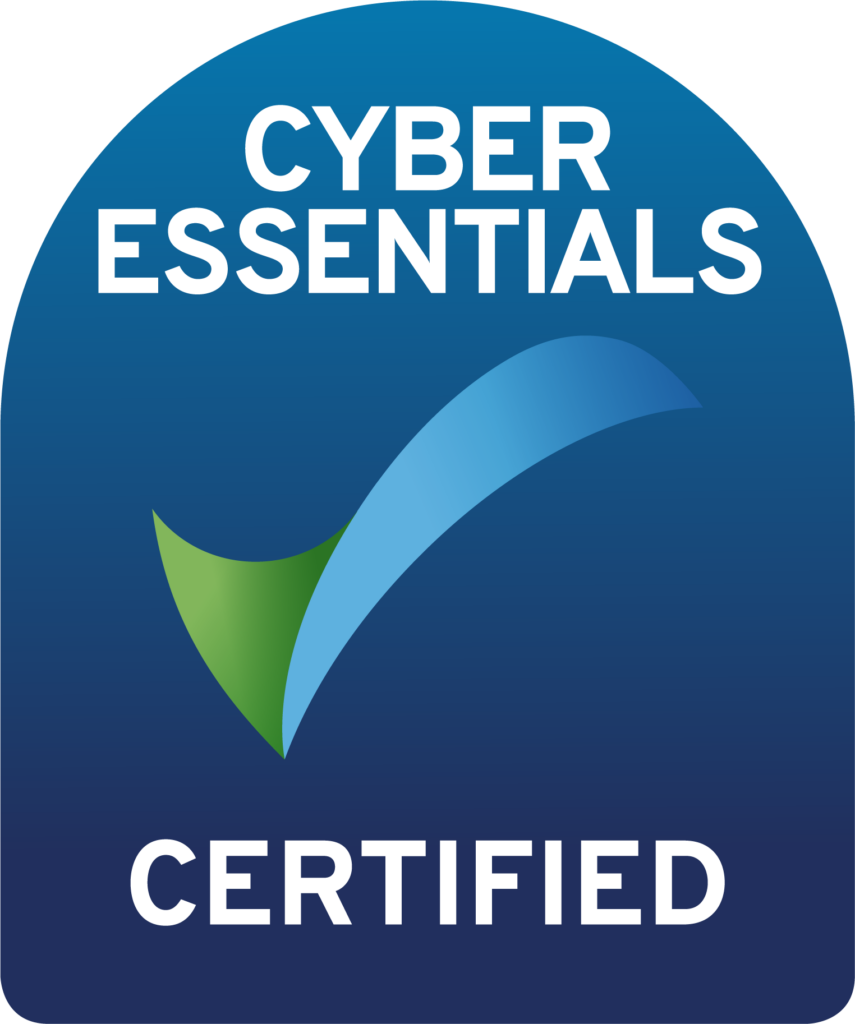
Please note that some calls may be recorded for training and quality control purposes. See our privacy policy for more information on cookies and how to manage them.
COPYRIGHT © BUSINESS FIRST PARTNERSHIP 2024
- 360 Intelligence
Capital One Main Navigation
- Learn & Grow
- Life Events
- Money Management
- More Than Money
- Privacy & Security
- Business Resources
Is a business travel rewards credit card right for you?
July 16, 2024 | 5 min read
Business credit cards can be a useful tool to help support your company’s growth. They offer convenience when it comes to spending and provide a way to keep your business and personal expenses separate. But some cards come with added features and benefits—like travel rewards. These rewards can be particularly helpful if you travel for work, providing opportunities like earning bonus miles and gaining access to seamless booking platforms.
Learn more about how business travel rewards credit cards work and how a travel card might speak to your company’s needs.
What you’ll learn:
- Business travel rewards credit cards offer travel-specific benefits to cardholders.
- Some common benefits included with business travel rewards credit cards are miles that can be earned on everyday purchases, access to airport lounges, travel credits and more.
- When comparing business travel rewards credit cards, it can be helpful to review card-specific benefits, determine your spending habits as a business owner and research the terms and conditions.
Capital One Venture X Business
What are business travel rewards credit cards.
Business travel rewards credit cards are specifically designed with travel in mind. You’ll typically earn miles or points with every card purchase to then redeem for future travel expenses. Some cards offer elevated travel experiences or statement credits that can be used toward programs like TSA PreCheck® or Global Entry . And depending on the card issuer, you may also have access to additional card perks like flexible spending limits and free employee cards.
How do business travel rewards credit cards work?
While terms and conditions vary by card issuer, business travel rewards cards usually allow you to earn a certain number of points or miles based on how much you spend. Then, you can redeem your rewards for things like hotels, flights and more. For example, if you use your card to purchase company equipment, you may earn enough miles for a free flight on your next business trip.
Business travel rewards cards can support business growth by allowing you to optimize your spending. If you’re already paying for certain expenses, why not save on travel costs at the same time?
Business travel rewards card benefits
Business travel rewards cards offer a variety of benefits. While they can differ by card issuer , here are some common perks to look for:
- Unlimited miles: Some business travel rewards cards offer unlimited miles that can be earned on every business expense you make.
- Bonus miles: You may be able to earn bonus points or miles for hitting certain spending thresholds or as an annual credit.
- Travel credit: With some cards, you may receive a travel credit—sometimes as a one-time credit and sometimes recurring—that can be used toward travel-related expenses.
- Miles transfer partners: Business travel rewards credit card issuers may let you transfer your earned miles to airline or hotel loyalty programs to maximize your benefits.
- Welcome offers: Depending on the card, you may receive a welcome offer or sign-up bonus—typically in the form of a statement credit or as bonus rewards.
- Additional travel benefits: Certain business travel rewards cards offer other benefits to card holders, like access to certain airport lounges or statement credits that can be used toward TSA PreCheck® or Global Entry.
Additional Capital One business travel rewards card benefits
In addition to these travel-specific benefits, there are other advantages to having a business travel rewards credit card. For example, all Capital One business travel rewards cards come with features such as:
- Automatic payments: By setting up AutoPay on your account, you won’t have to worry about making on-time payments each month.
- Fraud liability: If your card is lost or stolen, you can expect an emergency replacement card—plus an advance, if needed.
- Year-end summaries: At the end of the year, you can receive a summary with a breakdown of your spending, which can help with budgeting and planning for taxes.
- Employee cards: You can get free employee cards to track expenses. Plus, you can set customized spending limits on each card.
- Access to Capital One Travel: You can use Capital One Travel to find the most competitive prices on hotels and use the price prediction feature to find the best time to book a flight. Plus, you can earn extra rewards when you book hotels and rental cars through this service.
How to choose a business travel rewards credit card
Here are some things to keep in mind when you’re searching for the best business travel rewards card for your needs:
Review the type of rewards offered
Business travel cards come with different reward redemption options and structures. For example, some offer rewards in the form of airline miles, while others offer points that can be used toward hotels. Some credit cards—like Capital One’s Venture X Business —offer a flexible rewards structure, which means you can redeem miles on flights, hotels, vacation rentals and more, with no restrictions or blackout dates.
Understand the terms and conditions
When you’re looking for a business travel rewards credit card, it can be helpful to understand the terms attached to the card you’re applying for. You may want to consider things like the interest rate and whether the card has an annual fee before you make your decision.
Evaluate your spending habits
Determining how much your business spends each month can give you a better idea of which card makes the most sense to apply for. For example, certain welcome bonuses have spending thresholds that must be met before you can earn your reward. Or if your spending needs fluctuate, you might look into a card with no preset spending limit.
Determine credit score requirements
Most business travel rewards cards have credit score requirements. If your business doesn’t have an established business credit score yet, your personal credit score may be used when determining eligibility.
Key takeaways: Business travel rewards cards
Deciding which business travel rewards credit card works best for you depends on a variety of factors. Understanding your travel needs—for both business and personal travel—can help you narrow down your choices. And reviewing the specifics of the travel card you’re applying for can help you make the most of your credit card.
If you’re interested in a card that has business-grade benefits combined with elevated travel experiences, compare Capital One’s business travel rewards credit cards today.
Related Content
All about capital one venture x business.
article | June 6, 2024 | 7 min read
Business travel rewards vs. cash back rewards credit cards
article | May 30, 2024 | 7 min read
A guide to business credit card rewards
article | April 25, 2024 | 6 min read
- Election 2024
- Entertainment
- Photography
- AP Buyline Personal Finance
- AP Buyline Shopping
- Press Releases
- Israel-Hamas War
- Russia-Ukraine War
- Global elections
- Asia Pacific
- Latin America
- Middle East
- Election Results
- Delegate Tracker
- AP & Elections
- Auto Racing
- 2024 Paris Olympic Games
- Movie reviews
- Book reviews
- Financial Markets
- Business Highlights
- Financial wellness
- Artificial Intelligence
- Social Media
More than 3 million pass through US airport security in a day for the first time as travel surges
A traveler walks through the departure area as airline catering workers who are employed by Gate Gourmet picket with their supporters, calling for a new union contract with raises and affordable health insurance, Wednesday, July 3, 2024, at Miami International Airport in Miami. A long Fourth of July holiday weekend is expected to create new travel records. (AP Photo/Lynne Sladky)
- Copy Link copied
More than 3 million people passed through U.S. airport security on Sunday, the first time that number of passengers have been screened in a single day as travel surges , according to the U.S. Transportation Security Administration.
The record, which was widely predicted to happen at some point over the July Four holiday weekend, topped the June 23 mark of more than 2.99 million screened passengers. Eight of the 10 busiest days in TSA’s history have come this year as the number of travelers tops pre-pandemic levels.
TSA was created after the terror attacks on Sept. 11, 2001, and replaced a collection of private security companies that were hired by airlines. The agency operates under the Department of Homeland Security, which said that agents on Sunday checked 35 passengers every second.
While Americans continue to grapple with inflation, travel costs including airline tickets and hotel prices have eased significantly from a year ago. Hotel rooms were 1.2% cheaper in May compared with a year ago, according to recent government inflation data. Those costs have been trending lower since the beginning of the year.
While most U.S. airlines lost money in the first quarter — traditionally the weakest time of year for travel — they were all expecting a summer of full planes.
This spring, American and Southwest said they expected solid second quarter profits. They joined Delta Air Lines and United Airlines in giving an upbeat outlook for the April-through-June period, which includes the start of peak season for carriers.
Delta reports its second-quarter earnings on Thursday, with analysts predicting sales of $15.5 billion, nearly $1 billion more than the same period a year ago. Next week, United and American issue their quarterly results, with Wall Street forecasting higher revenue from a year ago for both carriers.
Increasingly full planes since the pandemic shut travel down four years ago has brought some downside for airlines: complaints .
The Transportation Department said last week that it received nearly 97,000 complaints in 2023, up from about 86,000 the year before. The department said there were so many complaints that it took until July to sort through the filings and compile the figures.
That’s the highest number of complaints about airlines since 2020, when airlines were slow to give customers refunds after the coronavirus pandemic shut down air travel.
The Transportation Department said the increase in complaints was partly the result of more travelers knowing about their rights and the ability to file a complaint. Airlines receive many more complaints from travelers who don’t know how or don’t bother to complain to the government, but the carriers don’t release those numbers.
Associated Press Airlines Writer David Koenig contributed to this story.
- Best Travel Insurance 2024
- Cheapest Travel Insurance
- Trip Cancellation Insurance
- Cancel for Any Reason Insurance
- Seniors' Travel Insurance
- Annual Travel Insurance
- Cruise Insurance
- COVID-19 Travel Insurance
- Travel Medical Insurance
- Medical Evacuation Insurance
- Pregnancy Travel Insurance
- Pre-existing Conditions Insurance
- Mexico Travel Insurance
- Italy Travel Insurance
- France Travel Insurance
- Spain Travel Insurance
- Canada Travel Insurance
- UK Travel Insurance
- Germany Travel Insurance
- Bahamas Travel Insurance
- Costa Rica Travel Insurance
- Disney Travel Insurance
- Schengen Travel Insurance
- Is travel insurance worth it?
- Average cost of travel insurance
- Is airline flight insurance worth it?
- Places to travel without a passport
- All travel insurance guides
- Best Pet Insurance 2024
- Cheap Pet Insurance
- Cat Insurance
- Pet Dental Insurance
- Pet Insurance That Pays Vets Directly
- Pet Insurance For Pre-Existing Conditions
- Pet Insurance with No Waiting Period
- Paw Protect Review
- Spot Pet Insurance Review
- Embrace Pet Insurance Review
- Healthy Paws Pet Insurance Review
- Pets Best Insurance Review
- Lemonade Pet Insurance Review
- Pumpkin Pet Insurance Review
- Fetch Pet Insurance Review
- Figo Pet Insurance Review
- CarePlus by Chewy Review
- MetLife Pet Insurance Review
- Average cost of pet insurance
- What does pet insurance cover?
- Is pet insurance worth it?
- How much do cat vaccinations cost?
- How much do dog vaccinations cost?
- All pet insurance guides
- Best Business Insurance 2024
- Business Owner Policy (BOP)
- General Liability Insurance
- E&O Professional Liability Insurance
- Workers' Compensation Insurance
- Commercial Property Insurance
- Cyber Liability Insurance
- Inland Marine Insurance
- Commercial Auto Insurance
- Product Liability Insurance
- Commercial Umbrella Insurance
- Fidelity Bond Insurance
- Business Personal Property Insurance
- Medical Malpractice insurance
- California Workers' Compensation Insurance
- Contractor's Insurance
- Home-Based Business Insurance
- Sole Proprietor's Insurance
- Handyman's Insurance
- Photographer's Insurance
- Esthetician's Insurance
- Salon Insurance
- Personal Trainer's Insurance
- Electrician's Insurance
- E-commerce Business Insurance
- Landscaper's Insurance
Best Credit Cards of 2024
- Best Credit Card Sign-Up Bonuses
- Best Instant Approval Credit Cards
- Best Cash Back Credit Cards
- Best Rewards Credit Cards
- Best Credit Cards for Bad Credit
- Best Balance Transfer Credit Cards
- Best College Student Credit Cards
- Best 0% APR Credit Cards
- Best First Credit Cards
- Best No Annual Fee Cards
- Best Travel Credit Cards
- Best Hotel Credit Cards
- Best American Express Cards
- Best Amex Delta SkyMiles Cards
- Best American Express Business Cards
- Best Capital One Cards
- Best Capital One Business Cards
- Best Chase Cards
- Best Chase Business Cards
- Best Citi Credit Cards
- Best U.S. Bank Cards
- Best Discover Cards
- Amex Platinum Card Review
- Amex Gold Card Review
- Amex Blue Cash Preferred Review
- Amex Blue Cash Everyday Review
- Capital One Venture Card Review
- Capital One Venture X Card Review
- Capital One SavorOne Card Review
- Capital One Quicksilver Card Review
- Chase Sapphire Reserve Review
- Chase Sapphire Preferred Review
- United Explorer Review
- United Club Infinite Review
- Amex Gold vs. Platinum
- Amex Platinum vs. Chase Sapphire Reserve
- Capital One Venture vs. Venture X
- Capital One Venture X vs. Chase Sapphire Reserve
- Capital One SavorOne vs. Quicksilver
- Chase Sapphire Preferred vs. Capital One Venture
- Chase Sapphire Preferred vs. Amex Gold
- Delta Reserve vs. Amex Platinum
- Chase Sapphire Preferred vs. Reserve
- How to Get Amex Pre-Approval
- Amex Travel Insurance Explained
- Chase Sapphire Travel Insurance Guide
- Chase Pay Yourself Back
- CLEAR vs. TSA PreCheck
- Global Entry vs. TSA Precheck
- Costco Payment Methods
- Chase Ultimate Rewards Guide
- Capital One Rewards Guide
- Amex Membership Rewards Guide
- All Credit Card Guides
- Raisin (SaveBetter) Interest Rates
- Citibank Savings Account Interest Rate
- Capital One Savings Account Interest Rate
- American Express Savings Account Interest Rate
- Western Alliance Savings Account Interest Rate
- Barclays Savings Account Interest Rate
- Discover Savings Account Interest Rate
- Chase Savings Account Interest Rate
- U.S. Bank Savings Account Interest Rate
- Marcus Savings Account Interest Rate
- Synchrony Bank Savings Account Interest Rate
- Ally Savings Account Interest Rate
- Bank of America Savings Account Interest Rate
- Wells Fargo Savings Account Interest Rates
- SoFi Savings Account Interest Rate
- UFB Direct Savings Account Interest Rate
- Best Savings Accounts & Interest Rates
- Best High Yield Savings Accounts
- Best 7% Interest Savings Accounts
- Best 5% Interest Savings Accounts
- Savings Interest Calculator
- Emergency Fund Calculator
- How much will $1,000 earn in a HYSA?
- How much will $10,000 make in a HYSA?
- Pros and Cons of High-Yield Savings Accounts
- Types of Savings Accounts
- Is Savings Account Interest Taxable?
- Checking vs Savings Accounts
- Average Savings by Age
- How Much Should I Have in Savings?
- How to Save Money
- Compare Best Checking Accounts
- Compare Online Checking Accounts
- Best Business Checking Accounts
- Compare Best Teen Checking Accounts
- Best Student Checking Accounts
- Best Joint Checking Accounts
- Best Second Chance Checking Accounts
- Chase Checking Account Review
- Bluevine Business Checking Review
- Amex Rewards Checking Account Review
- Best Money Market Accounts
- U.S. Bank Money Market Account
- Money Market vs. Savings Account
- Best CD Rates
- Best 1-Year CD Rates
- Best 6-Month CD Rates
- Best 3-Month CD Rates
- 6% CD Rates
- Synchrony Bank CD Rates
- Capital One CD Rates
- Barclays CD Rates
- How To Get A Loan
- Loan Interest Calculator
- How To Prequalify for a Personal Loan
- What is a Payday Loan?
- How To Get a Loan With No Credit History
- Financial Hardship Loans
- Low-Income Personal Loans
- No Credit Check Loans
- Why Can't I Get a Loan?
- Cash Advance Apps
- Credit Cards
- Chase Credit Cards
- Ink Business Premier
On This Page
- Key takeaways
- Ink Business Premier℠ Credit Card Review
- Ink Business Premier℠ Credit Card Rewards
- Ink Business Premier℠ Credit Card Benefits
- Ink Business Premier℠ Credit Card The fine print
- Ink Business Premier℠ Credit Card Drawbacks
How Ink Business Premier℠ Credit Card compares
Should you get an ink business premier℠ credit card, ink business premier® card: faqs.
Ink Business Premier℠ Credit Card: Straightforward Rewards for Big Spenders
- What we think: Ink Business Premier℠ Credit Card is a straightforward cash-back credit card, offering between 2% and 5% cash back. Its simplicity is attractive, but the high annual fee and the fact that most rewards are tied to high-ticket purchases limits its usability. Still, other perks, like travel protection and business benefits, make this card a solid addition to professionals’ wallets.
- Take the guesswork out of rewards with three flat-rate tiers: 5% on Chase Travel℠ expenses, 2.5% on business expenses over $5,000 and 2% on all other business purchases.
- The welcome bonus is impressive, with an incentive of earning $1,000 cash back if you spend $10,000 within three months of having the account.
- The annual fee of $195 is slightly high but can easily be offset if the card is used often enough.
- Key benefits include trip delay and cancellation insurance, auto rental collision insurance, free employee cards and purchase protection.
Ink Business Premier℠ Credit Card is a pay-in-full card that mostly revolves around stacking up rewards. Luckily, that’s easy to do, as long as you’re charging large-ticket items that total at least $5,000.
Perks, such as free employee cards, travel protections and no foreign transaction fees, all serve as hefty benefits for businesspeople who spend a lot of time on the road and need a way to maximize return on necessary buys.
However, this Chase business card does come with its limitations. While the flat-rate rewards scheme is enticing, you can’t transfer rewards to hotel or airline programs for discounts or special privileges.
Lastly, there’s also the $195 annual fee. It’s less than many other high-end cards but can still prove a disadvantage if you don’t qualify for the welcome offer or spend enough in a year to offset the fee.
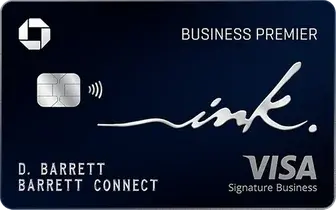
Ink Business Premier℠ Credit Card: Review
Ink Business Premier℠ Credit Card is tempting due to its straightforward rewards program and the potential for lots of cash back. But before you decide whether this card is right for you, we need to dig a little deeper.
Is Ink Business Premier worth it?
Chase Ink Premier is worth it for businesses who spend at least $5,000 per transaction and swipe their cards frequently. That $5,000 threshold is what gets you access to the 2.5% cashback rewards tier, meaning each $5,000 transaction gets you $125 back.
This business travel card is also worthwhile if you travel regularly and prefer to book through Chase Travel℠, opening up the highest rewards tier and 5% cash back.
But this is a charge card that you must pay off every month, so if you tend to carry a balance, you could easily sacrifice any accumulated rewards in the face of mounting interest.
Ink Business Premier: Highlights
- Annual fee: There’s an annual fee of $195.
- Reward rate: This card’s flat-rate rewards scheme offers 2.5% cash back on purchases of at least $5,000, plus unlimited 2% cash back on all other business-related buys. Chase Travel purchases offer the best rewards rate at 5% total cash back.
- Welcome offer: Earn a $1,000 cashback bonus once you charge at least $10,000 in purchases within three months of opening your account.
- Key perks: The flat-rate rewards scheme is easy to follow, and additional perks, such as purchase and travel protections, are attractive as well.
- Drawbacks: The card must be paid off in full every month, and cardholders making smaller purchases won’t rack up cashback bonuses very quickly.
Pros and cons
- High reward rate on large purchases
- Generous welcome bonus
- Flexible rewards system
High annual fee
- Large spending requirement for welcome bonus
- No access to transfer partners without another eligible Chase card
Who is Ink Business Premier best for?
The Chase Business Premier credit card is best for professionals who buy a lot of big-ticket items. This card has a rewards scheme that’s easy to understand and doesn’t deal with pesky expenditure categories that many other rewards cards have.
Cardholders should be loyal to, or at least happy to, use Chase Travel for most of their travel bookings. Ideally, cardholders will have other cards for racking up rewards on lower-ticket purchases like dinners out and basic office supplies.
Ink Business Premier℠ Credit Card: Rewards
Because you’re not truly building credit or expanding your spending bandwidth using the Chase Ink Premier card, the primary attraction is rewards — and lots of them.
Earning rewards
Rewards are straightforward and delivered in the form of cash back, points or miles:
- 5% cash back on all purchases made through Chase Travel℠.
- 2.5% cash back for purchases totaling at least $5,000.
- 2% cash back on all other qualifying business buys.
Redeeming rewards
Ink Premier offers cash-back rewards as Ultimate Rewards points , which you can accept and redeem in several ways.
Let’s take a look:
- Statement credits: Your monthly cashback rewards can be added straight to your account as statement credits.
- Direct deposits: You may choose to redeem your cash rewards as a direct deposit to your linked bank account instead of as a statement credit.
- Shop Through Chase (shop with points) : Use your Ultimate Rewards points to purchase products or services at a rate of 0.8 cents per point.
- Redeem points for cash back : Ultimate Rewards points have more value (1 cent per point) if you redeem them for cash versus spending them directly on Shop Through Chase purchases.
- Spend Points on Amazon : Link your Chase Ultimate Rewards account to Amazon.com and redeem points instantly when you check out on the Amazon website or via the retail giant’s branded app.
- Gift cards : Points earned via your Chase Premier credit card may also be redeemed for gift cards at the rate of 0.8 cents per point.
Welcome offer
The Ink Business Premier credit card rewards new cardholders with a tempting welcome offer. Spend $10,000 within the first three months of opening your account and earn $1,000 in cash back.
Ink Business Premier℠ Credit Card: Benefits
Rewards are a big part of the Chase Bank Premier credit card, but there are other benefits on deck that help make this card a solid option for enterprising professionals.
Travel benefits
- Trip cancellation and interruption insurance : Ink Premier offers limited coverage for non-refundable travel expenses if your trip is cut short or canceled altogether due to a qualifying event, such as severe weather or illness.
- Auto rental collision damage waivers : Cardholders receive primary auto rental collision damage coverage for business-related rentals.
- Trip delay reimbursement: If your trip is delayed by at least 12 hours or overnight, you may be eligible for reimbursement for key expenses like meals, toiletries, lodging and essential medication. Reimbursement maxes out at $500 per ticket, per trip.
- Baggage delay insurance : You may be reimbursed for items purchased due to delayed arrival of your baggage, including essential items such as clothes and toiletries.
- Travel and emergency assistance services : Access vital services, including legal and travel assistance, to help overcome hurdles while you’re on the road. Note that these services may be facilitated by the card issuer, but the costs of the actual services are typically payable by the cardholder.
- Roadside dispatch services : Leverage handy road dispatch service to help get you going again in the event of an empty gas tank or flat tire.
Business benefits
- Free employee cards : Give your employees their own cards attached to your account for no extra charge.
- Track employee spending : Use the card’s digital tools to monitor employee spending and set spending limits, as needed.
- Account alerts : Set notifications to alert you when a purchase is made using your main card or an employee card.
Shopping benefits
- Extended warranty protection : Extend the original warranty eligible purchases by an additional year — only applicable for qualifying warranties of up to three years.
- Purchase protection : Safeguard purchases from theft or damage with extra protection that includes up to $10,000 per purchase, up to $50,000 total per account.
- Fraud protection : Chase monitors for fraudulent activity round-the-clock, with administrators accessible via text, phone and email if you suspect unauthorized use.
- Zero liability protection : Cardholders are not liable for unapproved purchases made by someone using their card without their permission.
- Cell phone protection : All employees listed on your cell phone bill receive theft and damage coverage via your Ink Premier card. Claims are limited to $1,000 each and are subject to a $100 deductible, with a cap of no more than three claims per account per year.
Ink Business Premier℠ Credit Card: The fine print
Let’s take a look at the basics of Ink Business Premier.
- Annual fee: $195
- Foreign transaction fee: None
- Late payment fee: $40 or 2% of the minimum payment due, whichever amount is greater
- Cash advance fee: $15 or 5% of the total transaction amount, whichever amount is greater
Interest rates
- Regular APR: 19.49% - 27.49% variable APR (only applicable as part of Chase’s Flex for Business feature)
- Cash advance APR: N/A
- Intro APR offer: N/A
Credit limit
Credit limits for the Ink Business Premier card start at $10,000, but particularly creditworthy applicants, those with high credit scores and lofty income, could start out with even higher limits.
Ink Business Premier℠ Credit Card: Drawbacks
Chase Ink Business Premier has a lot going for it, especially if you’re into straightforward rewards programs, but there are some drawbacks worth noting before you start filling out your application.
Can’t transfer points to hotel or airline partners
Some cards — and many of Chase’s own offerings — allow consumers to transfer rewards to other cards or approved hotel and airline partners. Ink Premier offers no such perk, focusing instead on cashback rewards and a low-value, very limited secondary point-based rewards system.
Chase Ink Business Premier has an annual fee of $195. While that’s still lower than the annual fee charged by some competitors, it’s still almost $200 you’ll need to offset with rewards to justify the expense. Instead, a no-annual-fee card may be a better choice.
Must pay your balance in full every month
Because the Ink Business Premier credit card is a charge card , you’re expected to pay off the total amount owed each month. Late payments are subject to a penalty of $40 or 2% of the minimum payment due.
However, there is a bit of a loophole here. You can take advantage of Chase’s Flex for Business feature to pay off your balance over time, but the amount owed will be subject to an interest rate of 19.49% to 27.49% variable APR.
As you explore the ins and outs of the Chase Ink Premier card, see how it stacks up against some other prominent options.
Ink Business Premier℠ Credit Card vs. Ink Business Unlimited® Credit Card
The Chase Ink Business Premier and Ink Business Unlimited® Credit Card have a lot of overlap, but the Premier card has a better rewards scheme, with 2%-5% cash back on eligible purchases versus just 1.5% cash back with Ink Business Unlimited.
Premier also has a higher welcome bonus, although you’ll need to spend more to get it. Compared to the Ink Business, Premier also offers a few extra perks, including shopping benefits and protections and travel insurance. As for annual fees, Ink Business Unlimited skips them altogether, while Ink Premier charges $195.
▶︎ Read more: Ink Business Unlimited review
Ink Business Premier℠ Credit Card vs. American Express® Business Gold Card
Right off the bat, the American Express® Business Gold Card raises eyebrows with a weighty annual fee of $375 ( see rates and fees ) versus just $195 annually with Chase Ink Business Premier.
However, the Amex Business Gold offers a lot in return, including Amex Early and Preferred Access, member-only experiences and travel protections. Its point system is more complicated than Ink’s percentage-based cashback rewards, but you have the flexibility to earn the most on your highest spend categories.
Redemption procedures are also drastically different. With Ink Premier, you mostly deal cash back, plus the possibility of low-value point redemption via Chase Travel. But Amex gives you tons of options, including redeeming points for Amex Travel bookings, transferring points to travel partners or trading points for statement credits or gift cards.
▶︎ Read more: Amex Business Gold Card review
Ink Business Premier® Credit Card
Ink business unlimited® credit card.
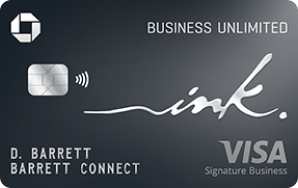
American Express® Business Gold Card
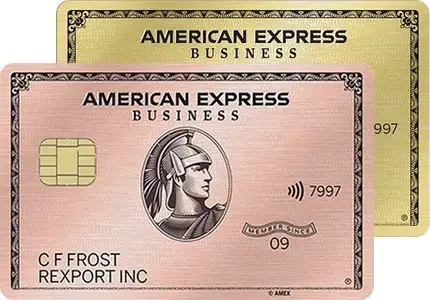
If you frequently make large business-related purchases or plan to do so in the future, you should consider applying for the Ink Business Premier card.
This cash-back card offers a decent rewards rate of 2% for general/lower-total purchases, which increases to 2.5% for purchases of $5,000 or more. In other words, the more you spend on business-related expenses, the bigger your cash-back bonuses will be.
You might also consider Ink Business Premier if you’re willing to use Chase Travel to make your travel bookings, as the rewards rate there is a noteworthy 5%. For some people, this card may be best used in tandem with several other rewards cards.
How do you apply for an Ink Business Premier℠ Credit Card?
You can learn more about Ink Business Premier℠ Credit Card by visiting Chase’s website or submitting your application over the phone or by mail.
Is Ink Business Premier℠ Credit Card a good credit card?
Ink Business Premier is a good credit card for professionals who plan on using the card in a way that maximizes potential cashback bonuses and generates enough rewards to offset the card’s annual fee.
With cashback rates of 5% for Chase Travel purchases and 2.5% for big-ticket buys of $5,000 or more, the card’s rewards scheme is best suited for business owners who travel frequently and charge those higher amounts.
What is the credit limit for the Ink Business Premier® Card?
New Ink Business Premier cardholders are typically presented with a credit limit of at least $10,000. That said, every applicant’s initial credit limit is decided on a case-by-case basis according to various factors, including credit score, total income and the individual’s income-to-debt ratio.
What credit score is needed for a Chase Ink Business Card?
Chase Ink Business Premier is considered a more exclusive credit card, with applicants expected to have good to excellent credit . That translates to a credit score of at least 670. However, credit score is just one factor in play, alongside other considerations like total income and applicants’ debt-to-income ratios.
What is the easiest business credit card to get?
The easiest business credit cards for consumers to get are secured credit cards . These cards are open even to applicants with low or bad credit , as cardholders are required to make a cash deposit that acts as collateral against future purchases.
Is the Ink Business Premier℠ Credit Card hard to get?
The Ink Chase Bank Premier credit card may be difficult to get unless you have a good, or preferably excellent, credit score. Applicants with credit scores of at least 670 have an increased likelihood of approval.
About the Author

Alana Luna (Musselman) is a versatile storyteller with over a decade of writing experience. She is passionate about helping people build their business through unique and engaging content.
Some examples of her current freelance projects include building content strategies for small businesses, completing industry research to build case studies, crafting buyer guides and more.
She has a passion and keen ability to simplify complex ideas through storytelling to make it easier for readers to understand hard-to-digest information. To accomplish this, Alana’s writing holds strong three principles – content that educates, engages and entertains.
Explore related articles by topic
- Credit Card Reviews
- Compare Cards
- All Credit Card Articles
- American Express
- Capital One
- Types of Credit Cards
- Travel Cards & Benefits
- Learn The Basics: Credit Cards 101
- Credit Scores & Reports Explained
- Tips For Building & Rebuilding Credit
- Card Rewards & Perks
Best Credit Cards for College Students in July 2024
Best Travel Credit Cards of 2024 | Compared & Reviewed
Best 0% Interest Credit Cards of July 2024 | 0% APR until 2025
Best Balance Transfer Credit Cards with 0% APR of 2024
Best Credit Cards with No Annual Fee in July 2024
Best Airline Credit Cards of 2024
Best Business Credit Cards of 2024
Best Starter Credit Cards If You Have No Credit History
Best Cash Back Credit Cards of 2024
Best Rewards Credit Cards of 2024
Best Credit Cards for Bad Credit 2024 | Cards for Credit Scores Below 690
Best Gas Credit Cards of July 2024
Best Hotel Rewards Credit Cards of 2024 | Earn Hotel Loyalty Points
Best AmEx Credit Cards of 2024
Best Discover Credit Cards 2024
Best Chase Credit Cards of 2024
Compare the Best Citi Credit Cards of 2024

What is a Good APR for a Credit Card?

What is a Bad Credit Score?

Does Closing a Credit Card Hurt Your Credit?

How Do Credit Cards Work? Understanding the Basics of Credit Cards

Difference Between Credit Cards and Charge Cards

How to Withdraw Money from a Credit Card - Cash Advances Explained

How to Build Credit: Steps to Build & Improve Your Credit Score
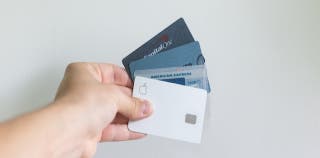
How Does Credit Card Interest Work? Understanding APR

What Is a Charge-off & How Can I Remove One from My Credit?

How to Increase Your Credit Card Limit Without Hurting Your Credit Score

What is the Credit Utilization Ratio? Calculate Your Ratio

How to Get Pre-Approved for an Amex Credit Card
Best Secured Credit Card of July 2024

How to Raise Your Credit Score Fast

What is a Good Credit Score? [And Why You Should Care]

How to Check Your Credit Score

How to Safely Get a Free Credit Report

How to Pay A Credit Card Bill - Payment Options & Tips

Differences Between a Soft Credit Check and a Hard Inquiry
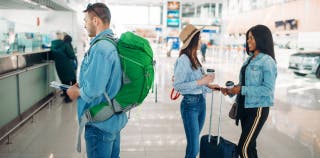
Global Entry vs. TSA PreCheck: Which Should You Get?
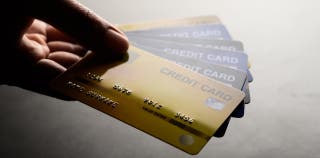
How Many Credit Cards Should You Have? (Can You Have Too Many?)

What Are Credit Card Numbers & What Do They Mean?

Can I Pay My Mortgage with a Credit Card?

Can You Transfer Money From a Credit Card to a Bank Account?

Payment Methods You Can Use At Costco
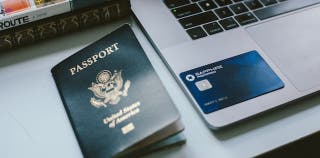
Chase's Pay Yourself Back Feature: Is it Worth it?

Renting a Car With A Debit Card: Everything You Need to Know

CLEAR vs. TSA PreCheck: What You Need to Know
Best U.S. Bank Credit Cards 2024

Guide to Chase Sapphire Travel Insurance Benefits 2024

2024 Complete Guide to American Express Travel Insurance
American Express® Gold Card vs. The Platinum Card®: Platinum Wins for Travel Benefits
American Express® Gold Card Review: Superior Dining Benefits
The Platinum Card® from American Express: Level-Up Your Travel
The Platinum Card® from American Express vs. Chase Sapphire Reserve®: Travel Card Duel
Best American Express Business Cards of 2024
Best Delta Air Lines Credit Cards of July 2024
Best Capital One Credit Cards 2024
How to Use CardMatch to Get the Best Credit Card Offers
Capital One Venture X Rewards Credit Card Review: Premium Travel Benefits
Capital One Venture Rewards Credit Card Review: Mid-Tier Travel Rewards
Capital One Venture Rewards vs. Capital One Venture X: Victory for Venture X
Capital One Quicksilver Card: Earn Simple Cash Rewards
Capital One SavorOne vs. Capital One Quicksilver: A Win for SavorOne
Capital One SavorOne Cash Rewards Credit Card: Rewards for Fun-loving Foodies
Blue Cash Preferred® Card from American Express: A Must-Have for Groceries
Fortiva Credit Card Review: Is It Any Good?
Milestone Mastercard® Review: Acceptable for Credit Building
Destiny Mastercard® Review: Good for Building Credit?
OpenSky® Secured Visa® Credit Card: Build Credit and Earn Rewards
Blue Cash Everyday® Card from American Express: Maximize Your Daily Spending
Delta SkyMiles® Gold American Express Card: Worth It? Maybe.
Delta SkyMiles® Reserve American Express Card: Worth it for Sky Club?
Delta SkyMiles® Platinum American Express Card: Travel Perks Aplenty
Capital One Venture X vs. Chase Sapphire Reserve®: Sapphire Succeeds
Capital One Platinum Credit Card: Unsecured Credit Building
Capital One Platinum Secured Credit Card: Low Security Deposit
Chase Sapphire Preferred® Card Review: Superior Travel Benefits
Chase Sapphire Reserve® Review 2024: Premium Travel Perks
Chase Sapphire Preferred® vs. Sapphire Reserve®: 2024 Comparison
First Progress Secured Credit Cards: What You Need To Know
Best Marriott Credit Cards of July 2024
Aspire® Cashback Reward Card Review: Up to 3% Rewards
Capital One Spark Business Cards: Which Is the Best?
Best Southwest Rapid Rewards Credit Cards of July 2024
Self - Credit Builder Account with Secured Visa® Credit Card: A New Way to Build Credit
FIT™ Platinum Mastercard® Review: Is It Worth It?
Marriott Bonvoy Brilliant® American Express® Card Review: Benefit-Rich but Pricey
Hilton Honors American Express Card Review: Decent Perks for No Annual Fee
United℠ Explorer Card Review: Good Value, Great Benefits
United Club℠ Infinite Card Review: Lounge Access and Luxury Perks
Best United Airlines Credit Cards 2024: Which Should I Get?
Chase Sapphire Preferred® Card vs. Capital One Venture Rewards: Sapphire Prevails
Chime Credit Builder Secured Visa®: Safer Credit Building
Chase Sapphire Preferred® Card vs. American Express® Gold Card: Gold Takes the Gold
Capital One Walmart Rewards® Mastercard® Review: 5% Back Online
Capital One VentureOne Rewards Credit Card: Decent Travel Perks for No Annual Fee

Best Credit Card Welcome Offers for New Cardholders
Chase Freedom Unlimited®: Impressive Rewards for No Annual Fee

Best Credit Cards for Building Credit July 2024

American Express® Business Gold Card: Easy to Earn 4X Points

The Business Platinum Card® from American Express: Luxury Benefits at a Cost
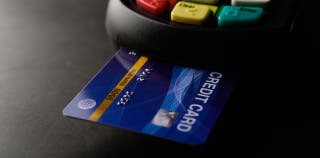
The Blue Business® Plus Credit Card from American Express: Solid Rewards for No Fee

The Plum Card® from American Express: Rewards for Paying Early
Capital One SavorOne Student Cash Rewards Credit Card: Superb Rewards for Students
Capital One Quicksilver Student Cash Rewards Credit Card: Uncomplicated Cash Back
Capital One QuicksilverOne Cash Rewards Credit Card: Good Rewards for Fair Credit
Capital One Spark Miles for Business Card: Simple Travel Rewards
Capital One Platinum vs. Capital One Quicksilver: Quicksilver Triumphs
Easiest Credit Cards to Get in July 2024
Best Beginner Credit Cards of 2024
Best Credit Cards for International Travel of 2024
Best Rewards Credit Cards With No Annual Fee July 2024
Best Cards With No Foreign Transaction Fee of July 2024
7 Best Credit Cards for Groceries of 2024
Best Metal Credit Cards of July 2024
Best Credit Cards for Young Adults July 2024
Best Cash-Back Business Credit Cards 2024
Best Credit Cards for Restaurants and Dining July 2024
Best Credit Cards for Teens of July 2024
Best Gas Cards for Businesses of July 2024
Best Business Travel Credit Cards of July 2024
Best Visa Credit Cards in July 2024
Best Credit Cards for Airport Lounge Access July 2024
Best Credit Cards for Fair or Average Credit of 2024
Best Credit Cards With No Credit Check July 2024
Best Credit Cards for TSA PreCheck & Global Entry in 2024
Best Credit Cards for Online Shopping for 2024
23 Benefits of the Chase Sapphire Preferred® Card
Blue Cash Everyday® vs. Blue Cash Preferred®: Clash of the Cash-Back Cards
Chase Sapphire Preferred® vs. Chase Freedom Unlimited®: Sapphire Wins for Travel
Chase Ultimate Rewards: All You Need to Know
Capital One Rewards: The Essential 2024 Guide
American Express Membership Rewards: The Essential Guide
Ink Business Unlimited® Credit Card: Simple Rewards, No Annual Fee
Ink Business Preferred® Credit Card: A Gold Mine for Businesses
14 Benefits of the Chase Freedom Unlimited® Card
Best Travel Rewards Credit Cards For Beginners
The Best Credit Cards for Hilton Hotels in 2024
Capital One Venture X Business: Premium Perks Worth the Fee
Ink Business Cash® Credit Card: High Rewards for No Fee
Best Business Credit Cards With No Annual Fee
Chase Business Credit Cards: Your Complete Guide
Reflex® Platinum Mastercard® Review: Fees, Fees, More Fees

Instant Use Credit Cards You Can Use Immediately After Approval
Mastercard Black Card Review July 2024

Hilton Honors American Express Surpass® Card: Hefty Fee, Heftier Perks

Delta SkyMiles® Reserve vs. The Platinum Card® from Amex: Platinum Comes Out Ahead

The American Express Blue Business Cash™ Card: Cash Rewards for No Fee
The Hilton Honors American Express Business Card: Worth it for Loyal Business Travelers
Marriott Bonvoy Business® American Express® Card: Good for Marriott Regulars
Surge® Platinum Mastercard® Review: High Price to Build Credit
Delta SkyMiles® Reserve Business American Express Card: Top-Tier Perks for Loyalists
Delta SkyMiles® Blue American Express Card: Good for Occasional Delta Flyers
Southwest Rapid Rewards® Plus Credit Card: Fewer Perks, Lower Fee
DoorDash Rewards Mastercard®: Delivery Fanatics Rejoice
Instacart Mastercard® Review: Solid Rewards for Instacart Lovers
Best Travel Credit Cards With No Annual Fee for 2024
* Opinions expressed here are those of the LA Times Compare Cards Team and have not been reviewed or approved by any advertiser or entities included within this content. See our editorial policy for more details.
All products or services are presented in this content without warranty. The information, including card details such as rates and fees, is accurate at the time of publish. Please visit each bank's website directly for the most current information.
Policy Details
LA Times Compare is committed to helping you compare products and services in a safe and helpful manner. Our goal is to help you make sound financial decisions and confidently choose your next credit card.
We work to ensure that the information and advice we offer on our website is objective, unbiased, verifiable, easy to understand for all audiences, and free of charge to our users. We don’t feature all products and services available on the market but provide a wide range of options from top providers offered through Bankrate. Bankrate has partnerships with issuers including, but not limited to, American Express, Bank of America, Capital One, Chase, Citi and Discover.
View Bankrate’s privacy policy .
We can offer our services thanks to partners that compensate us. This may affect which products we write about and where and how product offers appear on our website – such as the order in which they appear. This does not affect our ability to offer unbiased reviews and information about these products; all partner offers are clearly marked. Given our collaboration with top providers, it’s important to note that our partners are not involved in deciding the order in which brands and products appear. We leave this to our expert freelance writers who review and rate each product independently.
At LA Times Compare, our mission is to help our readers reach their financial goals by making smarter choices. As such, we follow stringent editorial guidelines to ensure we offer accurate, fact-checked and unbiased information that aligns with the needs of the Los Angeles Times audience. Learn how we are compensated by our partners.
- Early Prime Day quicklinks
When is Amazon Prime Day 2024?
What is amazon prime day.
- What should I buy?
- How long do deals last?
- Do you need to be a Prime member?
- Do other stores participate?
Is Prime Day an international event?
Amazon prime day deals 2024: everything to know about the sale, plus tips, and tricks.
When you buy through our links, Business Insider may earn an affiliate commission. Learn more
Amazon Prime Day has grown into one of the biggest sales events of the year, with discounts rivaling those of Black Friday and Cyber Monday. And with so many retailers selling on Amazon, Prime members can save on just about anything, from viral beauty products to big-screen TVs.
Prime Day is the first major deal holiday of the year, so it's an awesome chance to score summer discounts on big-ticket items and household staples. Amazon's 10th Prime Day event is officially underway, today July 16 until tomorrow, July 17. We're keeping tabs on all of the latest Prime Day news and deals.
- Shop the best Amazon Prime Day deals
Best Amazon Prime Day deals
The best Prime Day deals so far include all-time lows on brands like Apple, Sony, Vitamix, iRobot, Dyson, Ninja, and, of course, Amazon-owned products like the Fire TV , Kindle e-reader , and Echo smart speakers .
The Apple Watch Series 9 includes the latest S9 processor, a 2000-nit always-on Retina display, expanded Apple Health integrations with Siri, and a unique single-hand gesture to answer calls and interact with widgets.
The M3 Pro chips on the 16-inch MacBook Pro offer improved performance for intensive tasks like video editing and 3D graphic design, relative to the M2 and M1 generations.
Instant Pot's 4-quart Vortex Plus 6-in-1 Basket Air Fryer is a great solution for those with limited kitchen counter space, and it does everything larger models do at a fraction of the size and price, and the digital interface and knob make programming and adjustment a breeze.
Samsonite makes some of our favorite suitcases and offers incredible value at a moderate price. This set comes with a carry-on spinner and a large checked suitcase, and both are covered by a 10-year warranty.
Bose’s QuietComfort Ultra once more put the brand on top, with best-in-class noise canceling wrapped in a sleek and comfy design.
Hisense's U6N is one of the most budget-friendly Mini LED TVs on the market. It can deliver up to 600 nits of brightness with wide color support, making it an excellent entry-level HDR display.
This advanced electric razor offers the most effective, close shave out of all razors we've tried.
This magnetic portable battery pack from Anker has a capacity of 10,000mAh, which is more juice than Apple's MagSafe battery pack, which is rated at 1,460mAh.
This tiny plant set from Lego is designed for adults to enjoy assembling and then displaying. They're a fun way to display some greenery without worrying about any maintenance.
The C3 delivers excellent contrast thanks to its OLED Evo panel, and unlike similarly priced Samsung OLED TVs, it supports Dolby Vision.
Amazon Prime Day is underway now through July 17, 2024. The main sale began on the 16th at 12:01 a.m. PT (3 a.m. ET). Amazon will be unleashing fresh deals throughout the sale, though many discounts will be available both days. Lightning deals will be staggered throughout the 48-hour event and will only run for a limited time, or until stock sells out.
Amazon Prime Day is the retailer's annual mega sale and one of the major benefits of Prime membership. It's a two-day sales event, usually during the summer, that features products from every category, from fashion staples to hot new tech.
Though it used to be a deal holiday on a much smaller scale, Prime Day has grown exponentially since the first one in 2015. Now, you can find almost everything on sale for all-time low prices, matching discounts we see during Black Friday and Cyber Monday.
What should I buy during Amazon Prime Day?
Everything is fair game to buy during Amazon Prime Day. Whether you've been holding out on a pricey new TV or just need to stock up on toiletries, Prime Day is a good time to make your move.
We're seeing incredible prices on tech, including 4K TVs , Fire TV streaming devices , Apple products, Kindle e-readers , PC gaming accessories, Echo smart speakers , and top headphones picks. Prime Day tech deals feature brands like Logitech, Bose, Jabra, Sony, Roku, Samsung, TCL, and more.
If you're looking for style and beauty deals during Prime Day, brands like Tommy Hilfiger, Tatcha, Laneige, Levi's, Carhartt, Anastasia Beverly Hills, Adidas, and Marc Jacobs all feature products at rare low prices. That means skincare, makeup, shoes, men's clothing, women's fashion, and accessories will all be available for less.
Home and kitchen products are also seeing no shortage of Prime Day deals, with big names like Dyson, Shark, iRobot, Philips, KitchenAid, Nespresso, Casper, Leesa, and Coop down to all-time lows for the event. So, whether you need an air fryer , robot vacuum , mattress , or just some sturdy mixing bowls, Prime Day is a good time to buy.
You don't need to be focused on fancy new gadgets or treatments to shop smart during Amazon Prime Day either. We also catch tons of affordable household essentials available for even less every year, like toilet paper, dish soap, doggy bags, and makeup wipes. These deals are sweet since they save you money on stuff you needed to buy anyway.
How long do Prime Day deals last?
How long a Prime Day deal lasts differs between items, but in general, the best discounts start during the event and end before the 48-hour holiday is over. Some will last the whole two days while others will only last one, so it's always wise to act on a good sale when you see it. Lightning deals especially go fast, the most popular of which dwindle away in less than an hour.
I always recommend buying a product you've had your eye on as soon as it's highlighted as a Prime Day deal. Regardless of how long it's set to last, oftentimes, the best sales run out of stock, resulting in shipping dates being pushed out or the deal no longer being offered at all. We'll be providing all of the deal context you need to shop confidently and quickly, so be sure to check our roundups of the best discounts when the event rolls around.
Do you need to be a Prime member to shop Amazon Prime Day?
Amazon Prime Day is locked to Prime members only. It's one of the major benefits of subscribing to the service, in addition to other perks like free two-day shipping and Prime Video streaming.
If you have yet to become a member, you can sign up for a free 30-day trial to test it out. This should allow you to shop the sale, but it's not a guarantee since sometimes retailers will lock out free members from shopping the best deals.
Do other stores participate in Prime Day?
Although Prime Day is an Amazon-specific event, it's grown so large that other major retailers have started kicking off competing sales to overlap with it. If past years are any indication, Walmart, Target, and Best Buy will be holding competing sales.
These are definitely worth checking out; they often match the best deals on popular items you can find from Prime Day. We'll also be rounding these deals up so you can shop from the retailer that best suits you, whether you're a Target Circle cardholder, My Best Buy Plus member, or Walmart Plus subscriber.
Prime Day occurs in several other countries, but not all of them. Here's a list of countries where Prime Day will be available to shop:
- Netherlands
- Saudi Arabia
- The United Arab Emirates
- The United States
- The United Kingdom
Want to see what else Amazon has on sale right now? We've spotted some hefty price cuts on electronics, fashion, home, kitchen, laptops, and more on its main deals page .
- Main content
Expedia Rewards is now One Key™
Elektrostal, visit elektrostal, check elektrostal hotel availability, popular places to visit.
- Electrostal History and Art Museum
You can spend time exploring the galleries in Electrostal History and Art Museum in Elektrostal. Take in the museums while you're in the area.
- Cities near Elektrostal

- Places of interest
- Yuri Gagarin Cosmonaut Training Center
- Central Museum of the Air Forces at Monino
- Peter the Great Military Academy
- Bykovo Manor
- Balashikha Arena
- Balashikha Museum of History and Local Lore
- Pekhorka Park
- Ramenskii History and Art Museum
- Orekhovo Zuevsky City Exhibition Hall
- Malenky Puppet Theater
- Noginsk Museum and Exhibition Center
- Saturn Stadium
Mit Amex in die Lufthansa Business Lounge: Hier ist es möglich!

Lufthansa Business Lounge Hamburg: Moderner Komfort
Lufthansa business lounge berlin: wohnliche atmosphäre, lufthansa business lounge frankfurt: ruhe vor dem non-schengen-flug, lufthansa business lounge münchen: duschen vor dem langstreckenflug, lufthansa business lounge london: modernes design am lhr, weltweit kostenlos in lounges mit der amex platinum card, faq: häufige fragen und antworten.
Die Lufthansa Business Lounge am Hamburger Flughafen lässt bei der Ausstattung keine Wünsche offen: Hier findest du gemütliche Speise- und Arbeitsbereiche, schnelles WLAN, Drucker und Kopierer, deutsche und internationale Zeitungen sowie Monitore, die dich über den Status deines Fluges informieren.
Als Inhaber:in einer Amex Platinum Card ist der Zutritt in die Lounge – wie bei allen hier vorgestellten Lufthansa Business Lounges – für dich kostenlos, sofern du zusätzlich eine Bordkarte für einen Flug der Lufthansa-Gruppe hast*.
Lage: Terminal 2, nahe Gate A20
Öffnungszeiten: außer Samstag täglich 5:00 bis 21:00 Uhr, Samstag 5:00 bis 20:00 Uhr
Nice to know: Mit der Amex Platinum Card hast du kostenlosen Zugang zu mehr als 1.400 Flughafen-Lounges der American Express Global Lounge Collection an über 500 Flughäfen in mehr als 140 Ländern – darunter viele Lounges des bekannten Priority Pass Netzwerkes.*
Die komplette Liste der teilnehmenden Lounges und die Zugangsvoraussetzungen zu den jeweiligen Lounges findest du über die Amex App oder den Lounge-Finder von American Express.
Upgrade in die First Class
In der Lufthansa Business Lounge am Flughafen Berlin Brandenburg lässt du den Reisestress schnell hinter dir. Das moderne Lounge-Design, Regale zur Raumabtrennung, Bilder und dekorative Accessoires verleihen der Lounge ein wohnliches, einladendes Ambiente.
Entspanne dich mit einem kleinen Imbiss vom Büffet und einem Kaltgetränk in einem der Sessel – und genieße durch die großen Fensterfronten die Aussicht aufs Vorfeld.
Lage: Terminal 1 (Schengen-Bereich), gegenüber von Gate B20
Öffnungszeiten: täglich 05:00 - 20:45 Uhr
Nice to know: Wie bei vielen anderen Lufthansa Lounges teilt sich die Business Lounge in Berlin den Eingangsbereich mit der Senator Lounge. Die noch hochwertigeren Lufthansa Senator Lounges gehören teilweise ebenfalls zur Global Lounge Collection von Amex – darunter die Lounge in Berlin . Mit deiner Platinum Card erhältst du in der Senator Lounge kostenfrei Zutritt, wenn du mindestens in der Business Class der Lufthansa-Gruppe fliegst.
Die Lufthansa Business Lounge (Non-Schengen, Gates B24-B28) am Frankfurter Flughafen überzeugt mit einer modernen Ausstattung. Blättere vor deinem Flug durch nationale und internationale Zeitungen oder gönn dir eine kleine Mahlzeit und ein leckeres Getränk. Falls du dich vor deinem Langstreckenflug noch einmal frisch machen möchtest, kannst du den Duschbereich nutzen.
Lage: Terminal 1, Abflugbereich B in Richtung der Gates B24-B28.
Öffnungszeiten: täglich 6:00 bis 22:00 Uhr
Nice to know: Weitere Lufthansa Business Lounges findest du am Frankfurter Flughafen am Terminal 1 im Abflugbereich Z in Richtung Gate Z50 (Non-Schengen), im Abflugbereich A, nahe Gate A13 (Schengen), im Abflugbereich B in Richtung der Gates B44-B48 (Non-Schengen), im Abflugbereich A, nahe Gate A26 (Schengen) und im Abflugbereich C nahe der Gates C14-C15 (Non-Schengen).
Lust auf eine erfrischende Dusche vor der Reise? Dann bist du in der Lufthansa Business Lounge im Non-Schengen-Bereich des Airports der bayerischen Hauptstadt richtig. Neben Duschmöglichkeiten bietet die freundlich gestaltete Lounge am Münchner Flughafen Annehmlichkeiten wie komfortable Sitzmöglichkeiten, Arbeitsbereiche, Wi-Fi und eine Auswahl an Snacks und Getränken.
Lage: Terminal 2, Abflugbereich H, gegenüber von Gate H24
Öffnungszeiten: täglich 5:00 bis 22:00 Uhr
Nice to know: Am Münchner Flughafen gibt es weitere Lufthansa Business Lounges: Die Lufthansa Business Lounge (Non-Schengen) am Terminal 2, Satellitengebäude gegenüber von Gate L11; die Lufthansa Business Lounge (Schengen) am Terminal 2, Satellitengebäude gegenüber von Gate K11 und die Lufthansa Business Lounge (Schengen) am Terminal 2 gegenüber von Gate G28.
Mit der Amex Platinum Card und dem Boarding Pass eines Flugs der Lufthansa Group erhältst du auch in der Lufthansa Business Lounge am Flughafen London Heathrow (LHR) kostenlosen Zutritt. Die Lounge empfängt dich mit einem modernen Ambiente, großen Fensterfronten, bequemen Sitzmöglichkeiten und Arbeitsbereichen.
Hier kannst du dich in aller Ruhe mit leckeren Getränken an der Selbstbedienungsbar versorgen und mit Blick auf einen der Flugmonitore aufs Boarding warten.
Lage: Terminal 2A, hinter der Pass- und Sicherheitskontrolle
Nice to know: Vom kostenlosen Zimmerupgrade (nach Verfügbarkeit) bis zum Gratis-Dinner in einem Top-Restaurant: Mit deiner Platinum Card kannst du bei einem Trip nach London von vielen Vorteilen profitieren .
Die Amex Platinum Card ist deine Kreditkarte mit Lounge-Zugang und sorgt dafür, dass du dich an vielen Flughäfen entspannt vom Trubel zurückziehen kannst. Neben den hier vorgestellten Lounges gewährt sie dir in Kombination mit einer Bordkarte für einen Flug der Lufthansa Group kostenlosen Zutritt zu Lufthansa Business Lounges in zahlreichen anderen Städten weltweit – etwa am JFK in New York oder in Dubai .
Ob sich an deinem Zielflughafen eine Lufthansa Lounge oder eine andere Lounge der American Express Global Lounge Collection befindet, erfährst du in der Amex App oder im Lounge-Finder von American Express.
Darüber hinaus profitierst du mit der Platinum Card von zahlreichen weiteren Vorteilen wie einem umfangreichen Reiseversicherungspaket oder einem jährlichen Restaurantguthaben für Lokale in aller Welt. Du hast noch keine Platinum Card? Dann beantrage sie ganz einfach online .
Platinum Card oder Gold Card: Welche Karte lohnt sich für dich?
Deine reisegewohnheiten, deine einsparungen im jahr.

Wie komme ich in eine Lufthansa Business Lounge? Mit einer American Express Platinum Card hast du bei einem Flug mit der Lufthansa Group unabhängig von der Ticketklasse kostenfreien Zutritt zu ausgewählten Lufthansa Business Lounges. Was bieten Lufthansa Business Lounges? Die Lufthansa Business Lounges bieten verschiedene Annehmlichkeiten, die die Wartezeit am Flughafen angenehmer machen. Dazu gehören je nach Lounge kulinarische Köstlichkeiten, eine Auswahl an alkoholischen und nicht-alkoholischen Getränken, bequeme Sitzmöglichkeiten, internationale Zeitungen und Magazine sowie Duschen.
- Flughafen-Lounges
- Link kopiert!
Lust auf Reisetipps, Inspirationen und neue Impulse für deinen Lifestyle? Wir liefern dir die besten Storys und Neues aus dem AMEXcited-Kosmos direkt ins Postfach. Abonniere unseren Newsletter und erfahre die Highlights immer aus erster Hand.
Mehr zu dem Thema

Members can access discounts and special features
Elektrostal, visit elektrostal, check elektrostal hotel availability, popular places to visit.
- Electrostal History and Art Museum
You can spend time exploring the galleries in Electrostal History and Art Museum in Elektrostal. Take in the museums while you're in the area.
- Cities near Elektrostal

- Places of interest
- Yuri Gagarin Cosmonaut Training Center
- Central Museum of the Air Forces at Monino
- Peter the Great Military Academy
- History of Russian Scarfs and Shawls Museum
- Bykovo Manor
- Balashikha Arena
- Fryazino Centre for Culture and Leisure
- Military Technical Museum
- Church of Our Lady of Kazan
- Drama Theatre BOOM
- Balashikha Museum of History and Local Lore
- Pekhorka Park
- Ramenskii History and Art Museum
- Orekhovo Zuevsky City Exhibition Hall
- Borisoglebsky Sports Palace
- Fairy Tale Children's Model Puppet Theater
- Malenky Puppet Theater
- Church of Vladimir
- Shirokov House
- Pavlovsky Posad Museum of Art and History
- Noginsk Museum and Exhibition Center
- Saturn Stadium
- Zheleznodorozhny Museum of Local Lore
- Stella Municipal Drama Theater
- Fifth House Gallery
- Likino Dulevo Museum of Local Lore
- Malakhovka Museum of History and Culture
- Art Gallery of The City District

IMAGES
VIDEO
COMMENTS
These travel tips will help you save time and avoid the most common issues. Just sit back, relax and keep reading to get ready for the first of many business trips. 1. Pack like a pro. Start with proper carry-on luggage and take the time to pack light. Packing cubes and internal pockets can make all the difference for business travel.
Stacker traced the history of business travel, from ancient trade routes and steam locomotives to business-class airfare. From the first trade routes that were established in Eurasia in 3000 B.C., the exchange of goods across the globe has been a major driver of business travel. As technology advanced, so too did business travelers' modes of ...
Business travel insurance is a plan that protects employees who travel for work domestically or internationally. It usually covers occupational and non-occupational accidents and health cover while traveling on company business. Consult your travel policy or ask your employer if this will be available to you when you travel.
6. Get a good carry on. Having a good rolling carry-on suitcase is really important in securing a smooth business trip. There's nothing more stressful than running through the airport with a heavy duffel bag or a suitcase with no wheels. You'll just set yourself up for a stressful, sweaty disaster.
Embarking on your first business travel can be a rite of passage for many professionals. It presents an opportunity to represent one's company in new environments, forge valuable connections, earn business travel incentive, and sometimes even explore new cultures.. Early preparation is key to maximizing the benefits of the journey, and this begins with a clear understanding of what the trip ...
3. Keep your essentials packed and ready to go in your suitcase. Keep your essential items, such as toiletries and medicines, always at hand and ready to pack. If you travel often, it's a great idea to keep these items in a case which you only use for your trips. 4. Keep your essentials handy when on the road.
3 travel hacks to make your journey easier. Pre-trip planning is important, but once you're on your way, there are a few things you can do to make your trip easier and more comfortable: 1. Use apps. Download travel apps for real-time flight updates, seat selection, boarding passes, rental car reservations, hotel bookings, navigation, and more.
For most business trips, all you'll need is a rolling carry-on and a shoulder bag. You can even pack a suit in a carry-on if you fold it carefully. The fewer items you have to lug around while traveling, the better. Dress for the job you want. When traveling for work, you become the face of your employer.
10. Check-in for your flight online. Checking in and getting your boarding pass tends to be one of the more time-consuming parts of travel, but luckily, airlines have come up with ways to make it easier. For example, you can now check-in online for flights and add your boarding pass to your phone.
TSA PreCheck costs $78 and is valid for 5 years. 11. Use a Travel App to Keep your Bookings Organized. As a first-time business traveler, you want to stay organized and be in control of your trip. A business travel management software solution can help you manage your bookings and itineraries from one dashboard.
4. Choose Function Over Form. Your choice of equipment will impact your travel experience more than many other considerations. Suitcases and business cases top the list of business travel ...
Tip 5: Bring a backpack - NOT a roller briefcase. When traveling for work you likely will be issued a laptop that will allow you to work more efficiently while on your trip. Fight the temptation to buy an old-school wheeled laptop roller briefcase. Instead, buy a business-traveler-grade backpack.
First-class travel, because of the lower density of seating, can result inasmuch as four times the emissions as sitting in the back of the plane. ... EY's goal is to cut business travel ...
Corporate business travel involves the movement of individuals representing their organizations for work-related reasons. Whether it's attending client meetings, industry conferences, or sealing ...
Drink Water Instead of Booze. A lot of leisure and business travelers consider an airplane ride to be a great time to indulge in an adult beverage, two, or more. You should resist the temptation to do the same, especially if you need to get right down to business when you land.
In efforts to cut back on costs, the pandemic has shown that real estate and business travel are among the first areas to explore. Before the pandemic struck, global business travel was on a ...
FIRST Business Travel. www.first-business-travel.de | Hannover Germany. Wir sind für Sie da - immer und verlässlich FIRST Business Travel ist Ihr Geschäftsreisespezialist mit individuellem Service und größtmöglicher Kompetenz. Wir übernehmen die Buchung Ihrer Geschäftsreise und stehen Ihnen mit vielen weiteren Leistungen zur Seite.
Priority check-in and boarding. Complimentary upgrades for elite status holders. Not as expensive as business class or international first class. Cons. Typically no lie-flat seats. Lounge access ...
If you use travel credit cards, book with miles, and start shopping ahead of time, you could travel in business class more often -- or even every time you fly. Alert: our top-rated cash back card ...
The Business First Partnership 360 technology suite is designed, built and tested in-house by our travel technology developers, entirely with our clients in mind. Discover more We hold the retention and development of our talented team as our highest achievement, together with a company culture that delivers unrivalled service to each and every ...
Business travel rewards cards offer a variety of benefits. While they can differ by card issuer, here are some common perks to look for: . Unlimited miles: Some business travel rewards cards offer unlimited miles that can be earned on every business expense you make. Bonus miles: You may be able to earn bonus points or miles for hitting certain spending thresholds or as an annual credit.
Business travel spending may reach or even top pre-pandemic levels by the end of the year, a new report finds.. Why it matters: Leisure travel bounced back almost immediately after the worst of the COVID-19 pandemic. But business travel — a hugely important revenue source for airlines, hotels and so on — has taken longer to rebound as Zoom replaced some handshake meetings.
More than 3 million people passed through U.S. airport security on Sunday, the first time that number of passengers have been screened in a single day as travel surges, according to the U.S. Transportation Security Administration.. The record, which was widely predicted to happen at some point over the July Four holiday weekend, topped the June 23 mark of more than 2.99 million screened ...
With cashback rates of 5% for Chase Travel purchases and 2.5% for big-ticket buys of $5,000 or more, the card's rewards scheme is best suited for business owners who travel frequently and charge ...
Best Business Hotels in Elektrostal on Tripadvisor: Find 43 traveler reviews, 19 candid photos, and prices for business hotels in Elektrostal, Moscow Oblast, Russia.
When is Amazon Prime Day 2024? Amazon Prime Day is underway now through July 17, 2024. The main sale began on the 16th at 12:01 a.m. PT (3 a.m. ET).
Lyubertsy Tourism: Tripadvisor has 1,975 reviews of Lyubertsy Hotels, Attractions, and Restaurants making it your best Lyubertsy resource.
Travel Guide. Check-in. Check-out. Guests. Search. Explore map. Visit Elektrostal. Things to do. Check Elektrostal hotel availability. Check prices in Elektrostal for tonight, Jun 15 - Jun 16. Tonight. Jun 15 - Jun 16. Check prices in Elektrostal for tomorrow night, Jun 16 - Jun 17. Tomorrow night.
Lufthansa Business Lounge Berlin: Wohnliche Atmosphäre. In der Lufthansa Business Lounge am Flughafen Berlin Brandenburg lässt du den Reisestress schnell hinter dir. Das moderne Lounge-Design, Regale zur Raumabtrennung, Bilder und dekorative Accessoires verleihen der Lounge ein wohnliches, einladendes Ambiente. Entspanne dich mit einem kleinen Imbiss vom Büffet und einem Kaltgetränk in ...
Travel guide resource for your visit to Elektrostal. Discover the best of Elektrostal so you can plan your trip right. Vacation Packages. Stays. Cars. Flights. Support. All travel. Vacation Packages Stays Cars Flights Cruises Support Things to do. My Account. Members can access discounts and special features.